#(this is an example of people who were raised in Christian families deciding they have religious trauma because they had to go to church
Text
Ok, I finally saw Journey to Bethlehem and I can't begin to express how much I loved it, I'm a very difficult person to like a full musical, which is why movies like west side story and in the heights I only liked a few songs, like as movies in general they are good, but not to my personal taste.
Furthermore, the Christian film market usually ranges from very similar, commercial and honestly boring films, to 'reinterpretations' that remove plots and things that do not go at all with the Original material So I wasn't too confident in how good the trailer looked but I was willing to give it a look, thank goodness I did.
As a Christian who was raised in the church with a Christian family, my view of religion was quite Biased by their way of looking at it Which wasn't bad, but I was focused on the religious point of view sometimes excessively, so over time as I grew up and got to know the world around me, I moved away from that, And then after I grew up I returned to wanting to learn for myself without biased opinions about the Bible and to be able to understand it and really feel what everyone said they felt.
And so I came to the conclusion that You can save your self a Lot of time, if you just read the bible as what it is: a book, full of human people with a lot of imperfections, murky, miraculous, heartbreaking, crazy, steamy and even funny (yes, I'm not lying) stories. Religion, so focused on an idea that sometimes not even the Bible itself shares, forgets the human part that fills the stories, which is not very described in it either, but that one can easily interpret.
And thanks to this, criticism of Christians is very well founded on several occasions, and many people have the mistaken idea that the Bible is a 'holy book of holy people'.
That there is nothing more false, the book is holy or is different, unique and/or sacred because of how it was written and because of the stories that happen in it And how accompanied by prayer and the real desire to want to know, you can learn a lot no matter how many times you read it, not because of the people who lived them.
Who were they, let me tell you the test of God's patience.
Do you know Moses? The dude who divided the sea (by God's guidance), did you knew that (this one's funny), thanks to the people he brought out of Egypt after the plagues and that he have to spend 40 years with them in the desert? 🙃 no, it's not a joke and no, it's not an interpretation, literally thanks to the almost constant disobedience of the Israelis after being liberated they were punished with that, and the worst thing is that God had reasons, and I'll give you an example of that, these people decided to worship a damn golden cow that they built Because Moses had taken a long time to return from talking to God (when he went to look for the commandments ironically) less than a year after being freed by God from slavery.
Moses broke the first tables of commandments out of anger, and had to go look for them again, I repeat, no, I'm not playing, this is how it happened in the Bible And it was not only for this reason that they had to stay, it was a list of things that these people did, having as a testimony and example just by being free, still had Incredible faith problems.
The generation that left Egypt never saw or lived in the promised land, the only one who saw it out of mercy was Moses, but it was the descendants who managed to enter the promised land.
Haaa, bet you didn't knew that..
So, as you can see, no, not holy and/or perfect people at all. You might wonder, what does this have to do with the movie? And I will answer you, sorry, i got inspired, but the thing is, this is basically the context of why I liked it so much.
Journey to Bethlehem, it is the story of the birth of Jesus if we remove the religion and the holy holy beautiful peacefull look that some churches like to sell, and start to unite our 4 neurons and think about what, humanly, those people thought and did under the context of that time With fire songs, good performances, very good acting, and Milo (I'm not going to elaborate, I'll just say that I gained a tremendous crush on this man lmao)
And I want to list my favorite points from this in the movie.
-The representation of Mary
Arguably my favorite part of the movie, like, this woman really made me feel what it must have been like for her to carry the son of God.
Because N1: Mary is painted as this woman rejoicing in the news that she will become pregnant overnight when she is engaged, not married, in a patriarchal society With around 1000 laws about what you can and cannot do and the things you cannot do are punishable by death, One of them being being pregnant or having a child out of marriage 🙃🤭 what a blessing right?
And N2: For years Mary has been said to be holy and worshiped when she probably wouldn't approve of that herself, since she grew up with scriptures that said they couldn't worship idols. And they made her an idol. Something to make clear is that the only holy human, biblically speaking, is Jesus. Mary was a virgin, not a saint, she had more children with her husband after having Jesus, she had a life beyond him.
And this movie brings that out, it makes the most of it and I love it.
It shows what a struggle it must have been for her to have such a burden on her, she was young (in those days people married young), perhaps a teenager, Yes, they were raised differently and at the end of the day he was about to get married, but still, as I said, the Bible leaves out a lot of the human factor.
It can say that it passes a beginning and an end but it does not give you the means to connect both parts In the Bible, Mary respectfully accepts the news that she is going to have a baby, and the film respects that, but Mary was human, you know the fear and absolute madness must cause that an angel to appear to you out of nowhere and tell you that you are going to have a son who is going to be savior and king and then disappear (appreciation for the angel Gabriel btw My man would be me if i was an angel lmao) How the hell do you explain that to your parents? To your fiancé, no matter how versed everyone was in the scriptures, no one, NO ONE thought Jesus was going to be born from a humble virgin, Literally part of the reason (spoiler alert lmao) Jesus was killed was because no one believed that the king they were waiting for was a simple carpenter who was born in a manger. This probably included Mary herself, certainly her parents, and much more, Joseph. And she knew it, of course she knew it, she knew it was true but she had to know how hard it was to believe it and how much trouble she could get into for being pregnant. It's kind of expected that Mary would have doubts, rightly so which is why I love love the song "mother to a savior and king" i just feel that it had to be exactly what she thought.
... Give me eyes to see
Just how I can be
Carrying your son when I need You
To carry me
...Should a miracle feel like an anchor
Bringing shame upon my family
This burden is too heavy
I need strength to be
A mother to a savior and king
... You said, "Do not fear"
So Lord, if you are here
Help me have the faith you have in me
Give me eyes to see just how I can be
Mother to a savior
When I need saving
Like aaaa Chills, literal chills And I love it because it doesn't occur to people how society must have seen Mary, we see it as a blessing because we know how it all ended, but they didn't know. And they lived in a very very different society, if everyone had found out, they would have stoned Mary, that is the reality that they don't talk much about at Christmas.
Another fact that I liked is that Mary had to travel, traveling in this time does not imply the same as traveling in that time, with her 9 months of pregnancy (Because she gave birth as soon as she arrived in Bethlehem) on a donkey 🙃🙃🙃🙃 I don't think I have to elaborate much, i love how they portrayed here. You can say people knew how things were, they were used to it, yes, but Maria had never been pregnant and no matter how adapted you are to something, You can't erase the physical challenge of traveling with a giant belly in those conditions.
And let's not even talk about the birth, where they were in the city that: it was full of soldiers seeking to kill her and her baby, they broadcast the news that they would be killing babies and pregnant mothers In search of finding her, which is why they did not find asylum and had to go to a stable.
I think with the idea of ☺️ ah, Jesus was born in a manger ☺️We forget that 💀 oh, Jesus was born in a manger 💀 I don't know about you, but I think that is not the ideal place to give birth And yet the representations of that are so sugar coated We literally have a song called "Silent Night" tell me, explain to me what part of giving birth where the animals and their excrement are because an entire army is chasing you trying to kill you, sounds like a peaceful night????
Another detail is that Joseph (who I am obviously going to talk about) logically had to act as midwife for Mary, because no one was with them, no one wanted to be with them, that sounds like a horror story honestly, and no, I'm not taking away from how beautiful the whole purpose of Jesus is and everything is.
I am only pointing out the facts, which are raw and very Real about a situation like this, this was the reality as it is written, the Bible leaves things out But the rawness in several acts is never lacking.
One last thing to add is that I was afraid at first that they would portray Mary as a feminist ahead (by centuries) of her time But in an annoying and very political way because of how the movie started, And that they were going to make her not want the pregnancy and make it as if they had violently forced her, thank God that didn't happen, i loved her, The actress did a tremendous job interpreting her with personality without losing the respect (that is noted in the Bible) Mary had for God and the giant task she was given, and I actually liked that twist That perhaps Mary and Joseph did not know each other before they got engaged, which would not be unusual at that time. And that Mary said at the beginning of the movie that she believed she was destined for bigger things 🙃.They give more personality to this icon that we all have of her and I love it.
-The representation of Joseph
Starting with the fact that I have a big fat crush now on Milo Mannheim thanks to him (not important at all actually)
I think everyone, whether Christian or not, knows that Joseph is a secondary character every time the story of Jesus' birth is mentioned, even invisible I dare say. And I was always curious because of how he leaves after he is born in the Bible, it is simply not mentioned again and this is why I think there is this kind of unconscious belief that Jesus only had one parental figure and that was Mary.
When this can easily be contradicted by the little information we have in the Bible; Joseph was known as Joseph the carpenter, and who ended up being a carpenter? (Flashbacks to Sabrina lmao) Jesus, No matter how holy and amazing he was, Jesus grew up having to learn things, he wasn't born knowing, and obviously Mary didn't teach him how to work with wood so it's pretty logical to think that his stepfather (idk How to call it) taught him. That even if we leave this out (which is after the birth of Jesus) Joseph was THE man ok And this is with biblical foundation, he believed Mary and decided to continue with the wedding despite how crazy it all sounded, he helped her during the trip to Bethlehem, ALONE, he had to practically attend the birth
And the film captures that so, so well, I have no words to describe how impressed and excited I was to see how they highlighted so many things that I knew because yk, they are in the Bible but I hadn't been aware of noticing before.
How difficult it must have been for him to make the decision to believe Mary (which, let's be honest, takes a lot of faith to believe something like that) To follow her, and his song, my God, his song is so good. It's perfect for showing a morally gray human decision and the way he delivered that presentation ugh I just feel from my heart that it was exactly what Joseph thought. Cause:
I'm completely torn in two
Half of me believes her,
while the other half needs proof
This was no inmaculate conception
Just the ultimate deception
Gilty to the bone we should have her stoned now
Wait don't you throw your stoned no don't yoy judge her i look into her eyes i think i love her
I just 🫠🫠🫠 Jesus Christ
You don't come out of that movie without half falling for Joseph and that's something I never imagined saying in my life lmao
It was a very human way, full of personality and commitment, to portray the character. beyond the attractiveness of both the actor and the goofy personality they gave him. They gave it this degree of seriousness and part of the story that shows very clearly what they themselves say in the film and that is that God did not choose only Mary, She couldn't do everything she had to do alone, and among those things was raising a child that was given to her overnight and that she had to carry for nine months, and that does not deviate from history even though there are those who say no, it is written but I think it needed the human interpretation for people to see it, as I feel that they need with many stories from the bible. They definitely took their liberty to create the love story and I'm not complaining, I never thought at all that there must have been a lot of love both between them and for God for them to be able to go through all of that, And I like to believe that if it was like that, the love they had for each other, because only someone who loves another person so much is willing to go through all that, cause very easily Joseph could receive confirmation from God that what Mary said was true and say well, that's not my problem, but he decided to take responsibility with her, Which shows why God chose them, so yes, it has its freedoms but I don't think it is essentially far from reality.
Herodes
O. M. GOOOOODDD.
Antonio Banderas ate with his performance because damn I could feel the arrogance, the complete pleasure that those kings had for being rich and powerful, with that man And he didn't have much screen time, despite how comical he gets at times he manages to show how dangerous Herod was.
That, they didn't show it but that man ordered babies and pregnant mothers to be killed in the end, just for fear that they would take away his throne and his power, out of complete caress. And Antonio showed a funny and iconic man but also dangerous and capable of that and, and also they gave him the best song.
And i'm not Even joking, 'good to be king' is what Disney tried (and failed) to do with "Wish", It has all the magic and that lyricism that shows rough and raw things with incredible music That sticks to you despite how bad the bad guy is, from the villain songs of Disney's 2D movies, It's at the level of "poor unfortunate souls" and the Interpretation, God It's one of the best parts of the movie, weeks go by and I still can't get it out of my head
Finally, the relationship of Mary and Joseph.
I feel that all our lives, after thousands of times telling us the story of the birth of Jesus, the relationship of Mary and Joseph never had any importance beyond their role in the birth. So I loved the representation of that here, the way they took this theme of a planned marriage, which could very easily have been a reality, Along with the human and emotional reaction that these people must have had at the time, they give life and depth to Mary and Joseph, with the pros and cons.
With how difficult it was but also how strong they must have been as a couple to carry out the huge task they had, it made me see it from a more human point of view and give more value to their relationship.
They took their liberties, there are things that are super funny and have that absurd touch, but it is a story full of a lot of respect for the source, and full of a wonderful and human interpretation of of this great story, You don't feel it is religious, because it isn't, the music isn't just there and they are all very good (something that doesn't happen with all musicals).
And it is simply beautiful, it is made with love and it shows, they took advantage of every penny of their budget and put out this piece of art that I feel everyone should see for Christmas And that I would like to tattoo permanently on my brain lmao.
Go watch it, it's absolutely worth it.
If you made it this far, thank you for reading my entire almost essay of the movie, I hope you find your Joseph in life🫶😂
84 notes
·
View notes
Text
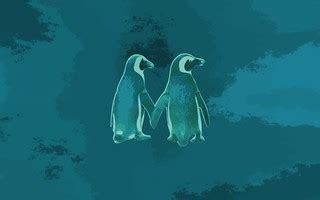
Chapter 3--Penguin Family Values: the nature of planetary environmental reproductive justice by Noel Sturgeon
Sturgeon’s article opens in a discussion of the award-winning nature documentary The March of the Penguins and how the animal was simultaneously adopted by “right-wing fundamentalist Christians in the United States as an inspiring example of monogamy, traditional Christian family values, and intelligent design” & was becoming “a symbol of the naturalness of gay marriage” to others(102)—Tango Makes Three (a children’s book based on ‘gay’ penguins at the Central Park Zoo who raised an egg—naturalness and success of gay marriage for raising children). “Queer families turn out to be just the same as straight families. […] they’re determined by nature” 117
Another example of penguins and reproduction in media—Happy Feet—singing/dancing and themes of normalcy. Homosociality and references of homosexuality but “always flavored with the kind of liberal tolerance covering over ultimate rejection that is thin veneer for heterosexist anxiety”. And ultimately, the main character’s differences are settled when he ends up ‘happily ever after’ in a heterosexual and successfully reproductive nuclear family.
“Penguins (along with polar bears) became popular symbols of what we would lose to global warming. Relatively invisible in the public cultural arena in contrast, were the growing and unequal effects of the pollution of our atmosphere on marginalized human beings such as indigenous peoples in the Arctic regions, who are struggling to preserve their cultures and societies in the face of rapid climate change” (102).
The author uses the term “Environmental Reproductive Justice” as a way of connecting environmental issues with social justice issues. This builds off insights by feminists of color and Global South feminists who tend to argue for the term ‘reproductive justice’ over ‘reproductive rights’—not just the ability to control pregnancy but also the need for childcare, health care, prenatal care, freedom from coerced sterilization, healthy environments, clean air, food and water, adequate housing, etc (103)
Living environmentalism-reproduction as necessarily about the intertwined reproduction of the environment, communities, and individuals (Giovanna Di Chiro, 2008)
How we reproduce—whether we are reproducing people, families, cultures, societies, and/or the planet—is politicized in several layered and contradictory ways (103). Gender and sexuality are often ignored as part of explanations when examining contemporary political and economic systems. I.e. when exploring the contradictions inherent in the right-wing—“far right conservatives have been able to mobilize low-income people on their side even though the political and economic policies working-class people are asked to support are contrary to their own class interests” (frank 2004)—gender roles and reproductive labor are not oft explored as ways they've been able to inspire feelings of fear, anger, oppression=abortion, ‘vulgarity’ in popular culture, homosexuality (I would also add transsexuality/transgenderism now), family values…all centered around gender expectations, driven by changes in economic practices in a globalizing economy (104)
“The politics of gender are often both the politics of reproductions and the politics of production—the intertwined ways that people produce more people, manage bringing up children, figure out how to do the work at home at the same time as the work that brings in a paycheck, decide how and where to buy food, clothing, shelter, and transportation, take care of elders, and create and maintain all of the social institutions that surround this work. And all of this is central to whether or not our ways of living cause environmental degradation.” (104)

“Heterosexual culture achieves much of its metacultural intelligibility through the ideologies and institutions of intimacy…First, its conventional spaces presuppose a structural differentiation of ‘personal life’ from work, politics, and the public sphere. Second, the normativity of heterosexual culture links intimacy only to the institutions of personal life, making them the privileged institutions of social reproduction, the accumulation and transfer of capital, and self-development…intimate life is the endlessly cited elsewhere of political public discourse, a promised haven that distracts citizens from the unequal conditions of their political and economic lives, consoles them for the damaged humanity of mass society, and shames them for any divergence between their lives and the imitate sphere that is alleged to be simple personhood” (Berlant and Warner, 1998 553) (105)
Heterosexist arguments are binary (homosexuality vs heterosexuality, ‘opposites attract’, ‘men are from Mars, women are from Venus’) and normative (heterosexuality is better, more natural, more moral, more normal, more wholesome, better for parenting). So social institutions are structured in a way that privileges heterosexual sexual practices and solidifies what a family should look like; who does the domestic work; how women/men should act, look, behave; how life should be maintained (producing heterosexuality) (105) These heterosexist arguments are usually about preserving and reproducing particular forms of family, social power, and economic practice.
Pro-life/pro-family—not just about preventing abortions, but about the reproduction of a certain historically and culturally specific idealized family form; father is authority; mother is helpmate and childcare provider; several children living in a framework of Christian, religious, patriarchal, heterosexual, nationalistic, U.S. and nuclear—right-wing. “The family acts as a miniature welfare state, modulating consumption, curbing excess desires, improvising child care and providing social security—[…]it is the dreamworld conveyed in the…’serious’ media…where the conservative variant of the neoliberal utopia is attributed to the biologically fixed ‘nature’ of desire (Lancaster 2003, 336) (106)
Fear of allowing women (especially young women, especially women of color, especially poor women—ESPECIALLY young, poor, women of color) have access to choices and support for their own reproductive decisions and thus forming families that do not adhere to the right-wing model…..divinely created=natural, normal so all else is unnatural and opposite of divine

This particular family model especially when located in a suburban, consumer economy dependent on extremes of global inequality, might be an important origin of our present environmental problems. (107)
Nuclear family model relies on women’s unpaid domestic labor (childcare, eldercare), using nonrenewable fuel-intensive transportation such as cars and long-distance shipping of consumer products, women as shoppers/consumers—these stores are part of globalized production and distribution chains dependent on exploitation of the labor of the poor (global south and often women) (107)
Environmental health is centrally important to reproduction as well as production (107) Reproduction is a materialist and a planetary issue—all reproduction comes with consequences for the global environment, economies and social practices.
Planetary reproduction and environmental reproductive justice
Deconstructing Polar Opposites: Endangered Peoples, Endangered Cultures, Endangered Natures
Missing from the conversation is the immediate threat to numerous groups of people especially vulnerable to climate change by reason of geography, poverty, or political discrimination (documentaries that use images of penguins and polar bears to dramatize the consequences of melting polar ice fail to mention the impact on Arctic Indigenous peoples…)
Indigenous people are not penguins, endangered tribal cultures are not endangered species—racist and the parallel trope of the ‘disappearing Indian’ discounts and obscures the struggle of real indigenous peoples to exist and successfully transform their cultures strategically for survival. Arctic indigenous tribes may be threatened by climate change but they are resilient and experienced in resisting threats to their people… (119)
“We’ve adapted in the past, which is why we are still here” (Chickaloon Grand Chief Gary Harrison, 2005)
Arctic Indigenous peoples have been addressing the problem and suggesting solutions for many years because they knew the threats they faced were early warnings for the people around the world.
“All of this will have a profound impact on the viability of indigenous cultures throughout the North and further afield. Everything is connected in nature; what happens in Alaska will affect all other places of the world as a cascading effect, as scientists call it, will occur” (Cochran 2007) (120)
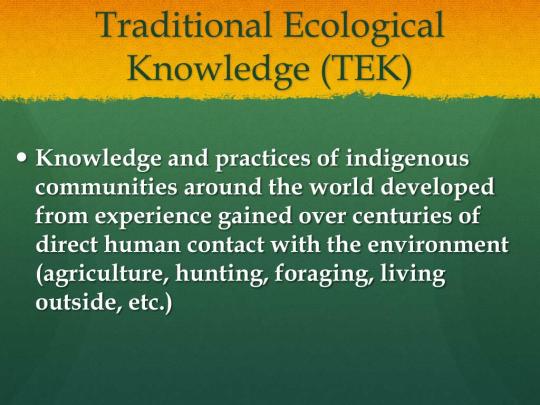
The possibility of losing indigenous knowledge along with the animals and ice….Subsistence living is part of cultural survival and an important method for keeping the world in balance (Harry Bower Jr. 121) The environment is part of a larger universe with moral and cultural aspects that are maintained by the practices of indigenous peoples who have lived on the land for thousands of years (121)
The expansive knowledge [indigenous people have] about sustainable practices, whether it was supported by scientific expertise or traditional experience, was knowledge that arose from a particular way of life, one that needed to be respected and maintained. It was not knowledge gained from the mystical identity of being Ecological Indians, but was rather sophisticated information needed now by all those, Indigenous or not, trying to understand and address climate change (121)
The reproduction of industrialized economic systems, particularly by the United States and other Western countries, has consequences for planetary ecological workings on a global scale as well as on the scale of communities, families, and species, determining the ability of animals, families and cultures to reproduce in healthy and sustainable ways (122)
Too Many People, Too Few Penguins

The concept of over-reproduction and over population are inherently problematic. Human reproduction (especially that of the poor, immigrants, and people in the Global South), is depicted as a major environmental problem…some environmentalists argue against having children at all.
The “Other” population is portrayed as the central problem environmentally and socially whereas “Our” society (developed industrialized societies) are made invisible.
We encourage ‘other’ societies to engage in family planning, education for women, birth control access among other things while ignoring how the US often prioritizes abstinence only programs rather than birth control for their own population, among failing to provide support for women when they do become pregnant (this article was written prior to roe v wade being overturned. But I bet that would be in this article now…)
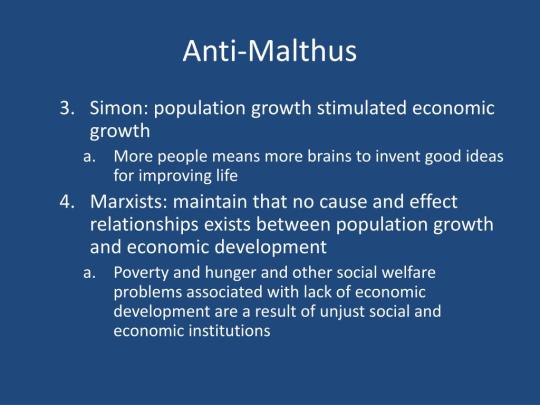
“When environmentalists sound warnings about overpopulation, they are usually expressing fears over the reproduction of (poor) nonwhite people, not of white people, whose populations in all Western countries are in decline (but whose consumption habits generally are not). Calls for educational fixes to inform ‘populations’ about why they should want to bear fewer children advance an imperialist cultural agenda that demands that nonwhite people adopt the cultural, social, and economic practices and systems of organization dominant in Western countries (e.g. the prototypical nuclear family), while blaming the ‘foolishness’ of Third World men and women (since the solution is Western education) for environmental degradation. (Gosine 2005, 80-81) (126)
Environmental Justice Family Values

“We are not outside the earth looking down upon it. Instead, we are inside specific biosystems and complex relationships with other biological entities; we impact and are impacted by the interrelationships of those entities. Responsibility to these ecological niches, networks and dynamics can be brought into view only if we understand ourselves as animals among other animals, with varied sexualities, complicated family relationships, complex political systems, and multiple desires. Perhaps we are peculiar animals with astounding abilities, but we are still part of an interconnected world and thus answerable to it” (129)
#queer ecologies: sex nature politics desire#penguins#arctic life#reproductive justice#overpopulation#malthusian theory#queer ecology#queer theory#ecofeminism#heteronormativity#critical ecology#ecology#environmental politics#colonialism#animal sexuality#media#traditional ecological knowledge#nuclear family#right wing#right wing extremism#united states#environmental justice#environmental reproductive justice#erotophobia#racism#classism#xenophobia#immigration#propaganda
9 notes
·
View notes
Note
If you grow up in a religion other than Christianity you’ll probably be a lot more aware of Christian influences on the wider culture because you’ll be exposed to that religion’s worldview firsthand. I was raised atheist in America and learning about various religions later in life I’ve been shocked how many Christian assumptions I internalized. But cultural Christian discourse often veers into the idea that atheists have full access to Christian privilege which is some serious BS.
Spending time in a different religion can absolutely make those things easier for someone to notice, but the thing is that you really can't make assumptions about how aware a person actually is based on their beliefs, or their family's beliefs.
I've seen people say that atheists as a whole are "culturally christian", but atheists can be Jewish, they can come from other religious backgrounds, and they can come from other cultural backgrounds.
I've seen people qualify that as "ex-christian atheists", but "ex-christian" doesn't mean anything other than that you were, at some point, christian. You could have also spent time in another religion, or come from a different culture.
I've seen people qualify it as "atheists who were raised christian"; what about atheists who were raised christian and another religion? What about atheists who also spent time in another religion?
And even if you were to qualify it as just, like, "people who have only ever been atheist and/or christian"- what about folks who've spent time with other influences?
Even if you were trying to identify specifically people who have never had any other cultural or religious influences: those people can still be just as aware of those things than folks who did have those outside influences.
This assumption that atheists are inherently more susceptible to "christian culture" has roots in two historically anti-atheist ideas:
Atheists have no morality of their own, and are inherently more likely to do Bad Things. They must be guided by religious (usually christian) people.
Atheists lack any kind of tangible ideas or beliefs of their own, and are therefore easier to convert.
Both of these ideas see atheism as a kind of "absence", rather than the presence of unique or valuable ideas.
I grew up atheist, and I can absolutely attest to the fact that this is something that very tangibly shaped the way I think about the world. Theese are ideas or attributes aren't exclusive to this upbringing, but just for example:
Death is not a looming fearful, taboo, miserable thing in my family; it's a natural and complete end to someone's life, and we discuss it pretty openly. Our memorials are a nostalgic celebration of that person's life.
I realized a lot of social "rules" were determined by Christian morality, and decided to build my own internal system of morality based on what I believed to be fundamentally important- which lead me to being interrogating and thinking deeply about everything I believed, and why.
I realized life was random & meaningless when I was very young, and decided this meant that my "purpose" was just a goal I got to make for myself, and change whenever I wanted to.
I decided that the most sensible trajectory was to just try to be happy- which means being the best version of yourself, in the best version of your community. Which means putting in the work to make that happen.
These are ideas people can absolutely develop through other cultures and beliefs, and they don't come with atheism for everyone, either; atheism just happened to be the reason for me. Just like another religion making someone more aware of christian hegemony doesn't mean it needs to be the reason for everyone.
#atheism#tell me what makes atheism uniquely Bad or atheists uniquely Gullible#without implying that atheism lacks substance meaning or philosophical potential
80 notes
·
View notes
Text
it's been too long for me to do an edit on that last jeremy video I posted but I think it's a good illustration of my *personal* take on what is a cult and what isn't:
you could argue JinJer's current church involvement with MacArthur constitutes cult-y behavior, and i can't say i'd disagree bc based on the general definition of the word there's a good argument to make
but I think it's a good example of the 'common' understanding of the concept of a cult, or what 99% of people you talk to are going to think of when you use that word: an extremely high control group with borderline nonsensical rules or social mores, which serve as benchmarks for just how deeply under someone else's control a person has become
when introduced to IBLP values jeremy, someone who is obviously used *and* open to high control value systems, immediately registered the arbitrary nature of all the rules and the fact that even in the world of right wing Christianity, a place not upheld for its logic, they didn't make any sense. because he had enough exposure to the outside world to be able to sort out abject fiction from the most basic definition reality.
and that degree of separation for me is the difference between a shitty set of beliefs you chose to confirm your own biases, and the modern understanding of a cult. Jeremy had a chance to have life experiences and decide what was true and important to him, and he still chose bullshit which makes him a bad person yea, but not necessarily a cult member.
whereas Jinger was raised isolated and in constant fear and anxiety up until she was married to this man so it only makes sense that she transferred over to another high control ideology. i mean family-wise, she essentially only had jeremy to rely on, and has had absolutely zero experience out in the world making decisions without some kind of authority over her, ya know? she went from extreme to extreme, and in the context of who is most vulnerable as far as joining a cult, i would argue many cult members were experiencing an 'extreme' of some sort in their life when joining some weirdo group seemed like a good idea to them.
16 notes
·
View notes
Note
Fair point about the price of the books. D&D can be an expensive hobby.
I don’t mean to be rude here. I’m sorry the wording is clunky. Have you read the PHB? It does provides all the information you need to create an character, from things as small as his/her height to complex elements like his/her religion, occupation, and backstory. The finer details like variants, subraces, and expansions are in the DMG and other source material simply because they were written at different times. For example, the shadar-kai just became a playable race in 5e this year. This information is all accessible online, too. But the PHB is designed with the intent that your DM will guide you with the information he or she has from the DMG, both in character creation and in the game. You’re supposed learn as you go and work collaboratively with your group. That’s not a design flaw. It’s like how video games and books typically won’t give you a huge exposition dump in the first chapter—you learn as the story unfolds. But it absolutely does give you all the information you need to jump into a game.
But I should have asked this first. Why do you think D&D ruined fantasy elves?
I have read the PHB, I just don't think it gives enough information about each races' culture. maybe enough to make them playable, but not enough to create a coherent vision of what those peoples are like. if the DM is supposed to provide that, I've never had any of them do that, which... yeah, that's a different problem. so instead players come up with whatever they like, which isn't a bad thing, but they've all come up with the same vision and it's lead to exactly what I was complaining about in the first place: elves being humans with pointy ears and extra special eyes
as for the information being available online - the hard part about that is, unless you already know what you're looking for, it can be difficult to discern which information is official and which is homebrewed. I understand that supplemental material is the stuff that wotc released later as they created more lore, but imo if it's supplemental, it shouldn't really be required. if that kind of stuff isn't accepted from video game devs, why do we accept it for ttrpgs?
I can't decide whether I believe "ruining" elves was intentional or not. wotc made their material less accessible by raising the price and increasing the number of material, but also strove to make their game more accessible to a wider audience. I suppose the latter negates the former for most people. regardless, making a material more ideologically accessible necessarily waters it down. fact of the matter is elves in fantasy media were inspired by Tolkien's elves, who were inspired by Christian angels. these elves are much more serious than the "elves" that players create today. that's not to say they don't have a sense of humor, but their long life, desire to preserve beautiful things in the world, and inherent connection with otherworldly magic creates a certain playstyle that is really not very accessible to a modern audience who kind of just want to play pretend family therapy. encouraging a d&d culture that mostly homebrews the entire game and reduces elves to humans with pointy ears and extra special eyes (and often a much shorter lifespan) so anyone can play them is much more profitable. other media will see the profitability and inoffensive "accessibility" of less special humanoid races and copy suit, as we have seen
4 notes
·
View notes
Text
Rerum Novarum: Part One
I’ve been studying Catholic social teaching/Christian democracy a bit lately, and decided to do a read-through of Pope Leo XIII’s encyclical on capital and labor; the title is Latin for “Of Revolutionary Change.” Some bullet points as a sort of TL;DR, except it also gets fairly long. I’ve decided to split this analysis into multiple parts-- this post goes through Nos. 1-15.
- Rerum Novarum condemns laissez-faire capitalism in no uncertain terms, calling it “the greed of unchecked competition" and “rapacious usury.”
- “A small number of very rich men have been able to lay upon the teeming masses of the laboring poor a yoke little better than that of slavery itself.” Pope Leo called out the top 1% all the way back in 1891, which I think is pretty neat.
- The one thing I wish Rerum Novarum addressed was the community of Christians in Acts-- the Bible’s pretty dang clear that the early church “had all things in common,” and “no one said that anything that belonged to him was his own” i.e., they were proto-socialists. (Acts 2:44, 4:32) Pope Leo just kinda launches ahead with his belief that the abolition of private property would “rob the lawful possessor, distort the functions of the State, and create utter confusion in the community.” Which, to be fair, the Bible is also pretty clear that stealing and coveting is wrong, and it’s easy to logically infer an affirmation of private property from that: you can’t steal or covet something that already belongs to everyone, including you.
EDIT: I should clarify again that I’ve only just started reading Rerum Novarum, and for all I know it does go back later and discuss the socialism in Acts-- however, from a rhetorical standpoint it had a perfect point to do so in Nos. 5-15 when it argues against socialism, as those two Bible verses can essentially unravel any arguments on the topic the Pope might have and I’d like to see his attempts at refuting them.
- Also there’s some gross patriarchal BS about male headship, but it’s 1891 and the Catholic Church, so I wasn’t really expecting anything else. However, I do technically agree with his statement that government shouldn’t intrude in and control the family unit, which is sort of libertarianism, I guess? It’s libertarianism but with the perception as the family as the unit of society rather than the individual. Even then, Pope Leo concedes that a family in dire need that cannot be provided for in any other way may have no other option than relying on public aid, and the government may also have to step in if family members are depriving each other of natural rights.
There’s still some interesting arguments against socialism, though:
- “They [socialists] would deprive him [the wage-earner] of the liberty of disposing of his wages, and thereby of all hope and possibility of increasing his resources and bettering his life.” In other words, capitalism allows people to be rewarded for their hard work, while socialism provides no motivation for people to work at all (since they’d all get the same resources/quality of life regardless of their work). Thus, why should people work at all under socialism?
- I don’t really follow his logic on this one as much, but Pope Leo also talks about how humans and animals are fundamentally different (which I agree with), and from there concludes that while all living creatures can possess things temporarily, it is a uniquely human right to possess things permanently. This raises some interesting questions for me: How do animals possess things, if they do so at all? Does my dog (who, interestingly enough, is named Leo) possess his own food and toys, or are they possessed by the humans that care for him and allotted for him to use? Perhaps this is the distinction between wild and domestic animals-- wild animals are able to “own” their things without having humans control them. Surely there must be some example of an animal in the wild that keeps something for years/its entire lifespan-- perhaps a nest or other type of habitat. Does a bear own the cave that it sleeps in? Would the community of animals that live in the Amazon rainforest own the forest, thus making human exploitation of it theft? Why would Pope Leo say that only humans can possess things permanently?
- “Man proceeds the State, and possesses, prior to the formation of any State, the right of providing for the substance of his body.” I like this one-- I personally believe in inherent human rights that are given to us by God, and even many atheists would likely agree with the principle of “certain unalienable rights,” as the American Declaration of Independence phrases it, even if they don’t necessarily believe they come from a Creator. These rights are guaranteed by a well-functioning and ethical state, but they are not PROVIDED by the state. However, one could easily make a counter-argument that a socialist state would be necessary in order to truly guarantee these rights.
- “Is it just that the fruit of a man’s own sweat and labor should be possessed and enjoyed by anyone else?” On the surface level, I’d say no. But the thing about capitalism in our modern society is that, as Pope Leo mentions earlier, these “fruits of labor” ARE being enjoyed by the megarich. You could argue that this is actually another way of saying that the workers should own, maybe not the means of production, but certainly the results of production.
All of this is even more interesting in light of the fact that 1891 and 2022 are very different times, and Pope Francis has been pretty critical of capitalism for several years now as far as I’m aware-- whether or not he’s actually socialist is up for debate. People have a lot of arguments for one or the other, but unless Pope Francis actually comes out and says straight-up that he’s a socialist I would be careful in labeling him as one. You can be highly critical of capitalism and still not necessarily socialist, which is how I would describe my current economic leanings.
I’d actually be super interested in hearing some commentary and POLITE discourse from both capitalists and socialists on this post, so long as it’s kept civil.
2 notes
·
View notes
Text

4th April >> Mass Readings (Except USA)
Easter Thursday
(Liturgical Colour: White. Year: B(II))
First Reading
Acts of the Apostles 3:11-26
You killed the prince of life: God, however, raised him from the dead.
Everyone came running towards Peter and John in great excitement, to the Portico of Solomon, as it is called, where the man was still clinging to Peter and John. When Peter saw the people he addressed them, ‘Why are you so surprised at this? Why are you staring at us as though we had made this man walk by our own power or holiness? You are Israelites, and it is the God of Abraham, Isaac and Jacob, the God of our ancestors, who has glorified his servant Jesus, the same Jesus you handed over and then disowned in the presence of Pilate after Pilate had decided to release him. It was you who accused the Holy One, the Just One, you who demanded the reprieve of a murderer while you killed the prince of life. God, however, raised him from the dead, and to that fact we are the witnesses; and it is the name of Jesus which, through our faith in it, has brought back the strength of this man whom you see here and who is well known to you. It is faith in that name that has restored this man to health, as you can all see.
‘Now I know, brothers, that neither you nor your leaders had any idea what you were really doing; this was the way God carried out what he had foretold, when he said through all his prophets that his Christ would suffer. Now you must repent and turn to God, so that your sins may be wiped out, and so that the Lord may send the time of comfort. Then he will send you the Christ he has predestined, that is Jesus, whom heaven must keep till the universal restoration comes which God proclaimed, speaking through his holy prophets. Moses, for example, said: The Lord God will raise up a prophet like myself for you, from among your own brothers; you must listen to whatever he tells you. The man who does not listen to that prophet is to be cut off from the people. In fact, all the prophets that have ever spoken, from Samuel onwards, have predicted these days.
‘You are the heirs of the prophets, the heirs of the covenant God made with our ancestors when he told Abraham: in your offspring all the families of the earth will be blessed. It was for you in the first place that God raised up his servant and sent him to bless you by turning every one of you from your wicked ways.’
The Word of the Lord
R/Thanks be to `God.
Responsorial Psalm
Psalm 8:2,5-9
R/ How great is your name, O Lord our God, through all the earth!
or
R/ Alleluia, alleluia, alleluia!
How great is your name, O Lord our God,
through all the earth!
What is man that you should keep him in mind,
mortal man that you care for him?
R/ How great is your name, O Lord our God, through all the earth!
or
R/ Alleluia, alleluia, alleluia!
Yet you have made him little less than a god;
with glory and honour you crowned him,
gave him power over the works of your hand,
put all things under his feet.
R/ How great is your name, O Lord our God, through all the earth!
or
R/ Alleluia, alleluia, alleluia!
All of them, sheep and cattle,
yes, even the savage beasts,
birds of the air, and fish
that make their way through the waters.
R/ How great is your name, O Lord our God, through all the earth!
or
R/ Alleluia, alleluia, alleluia!
Sequence
Victimae Paschali Laudes
Christians, to the Paschal Victim
offer sacrifice and praise.
The sheep are ransomed by the Lamb;
and Christ, the undefiled,
hath sinners to his Father reconciled.
Death with life contended:
combat strangely ended!
Life’s own Champion, slain,
yet lives to reign.
Tell us, Mary:
say what thou didst see
upon the way.
The tomb the Living did enclose;
I saw Christ’s glory as he rose!
The angels there attesting;
shroud with grave-clothes resting.
Christ, my hope, has risen:
he goes before you into Galilee.
That Christ is truly risen
from the dead we know.
Victorious king, thy mercy show!
Gospel Acclamation
Psalm 117:24
Alleluia, alleluia!
This day was made by the Lord:
we rejoice and are glad.
Alleluia!
Gospel
Luke 24:35-48
It is written that the Christ would suffer and on the third day rise from the dead.
The disciples told their story of what had happened on the road and how they had recognised Jesus at the breaking of bread.
They were still talking about all this when Jesus himself stood among them and said to them, ‘Peace be with you!’ In a state of alarm and fright, they thought they were seeing a ghost. But he said, ‘Why are you so agitated, and why are these doubts rising in your hearts? Look at my hands and feet; yes, it is I indeed. Touch me and see for yourselves; a ghost has no flesh and bones as you can see I have.’ And as he said this he showed them his hands and feet. Their joy was so great that they still could not believe it, and they stood there dumbfounded; so he said to them, ‘Have you anything here to eat?’ And they offered him a piece of grilled fish, which he took and ate before their eyes.
Then he told them, ‘This is what I meant when I said, while I was still with you, that everything written about me in the Law of Moses, in the Prophets and in the Psalms has to be fulfilled.’ He then opened their minds to understand the scriptures, and he said to them, ‘So you see how it is written that the Christ would suffer and on the third day rise from the dead, and that, in his name, repentance for the forgiveness of sins would be preached to all the nations, beginning from Jerusalem. You are witnesses to this.’
The Gospel of the Lord
R/ Praise to you, Lord Jesus Christ.
0 notes
Text
“Susan doesn’t get to go to Heaven with her siblings because she decided she liked lipstick and parties!”
One, there is a very simple reason Susan does not show up in Aslan’s Country with the others at the end of The Last Battle: she’s alive. Her siblings are in Aslan’s Country because they are dead. Susan is not there because she is not dead. That’s literally it.
Two, it’s a massive oversimplification of the text to try to boil things down to ‘Aslan finds mature femininity sinful’ or ‘she can’t be saved because she grew up’ (or my least favorite, saying she’s cast out because she “discovered sex”, which I find a pretty inappropriate statement to make about a very young teenager and a complete misunderstanding of the actual situation). The “problem of Susan” is not that she can’t go to Heaven because she grew up. Her story is that she struggles with her faith and allowed her desire to seem grown-up and part of the in-crowd become her driving influence, forgetting what was most important. It is not meant as a dig at femininity, it is meant to show a loss of priorities.
When Susan is in Narnia and faced daily with the truth, it’s easy for her to believe, but whenever she’s presented a challenge that will require an intentional show of faith, she always seemed to struggle (for example, in Prince Caspian she’s shown to intentionally choose her doubts over what she felt deep down, and thus took the longest to see Aslan again). After leaving Narnia the second time and readjusting to life in England, as time went on it would have gotten easier to gradually forget her faith when the evidence is no longer clearly spelled out in front of her, and eventually her memories that she once knew were true came to feel like nice childhood stories instead. With those memories, and consequently the testimony that once came with them, no longer real for her, she could allow herself to prioritize other things such as self-image. The story is not trying to say that liking to feel pretty is some sort of sinful indulgence, it’s trying to demonstrate how we can get distracted from what matters when we place too much importance on how the world sees us.
The point C.S. Lewis was making was that it’s important to be humble and not lose yourself in trying to appear so smart and so mature to others. Critically, Susan’s story is not just Susan’s story — it is Lewis’s story. Lewis was raised Christian but became an atheist and turned much of his focus on looking intelligent and grown-up, and when he came back to his faith later in life, he looked back on his choices feeling foolish for trying so hard to be so grown-up because it blinded him to what mattered to him. There is a difference between simply maturing into an adult, and becoming the specific kind of grown-up who tries to be grown-up, which is the particular thing that irritated Lewis and something that he frequently touched on in his works.
I wouldn’t know where to look for the quote now, but I remember Lewis saying that Susan was the character he related to the most because of her struggle. He had to intentionally choose his faith and act on it, and it wasn’t always easy. He understood how hard that can be and knew firsthand how one could let oneself forget if they’re not actively working at it. Lewis was not a misogynist who had it out for Susan — he WAS Susan. And on the other hand, Susan can be Lewis. Susan can find her belief again later in life. He specifically said as much, that she can find her way to Aslan’s Country in her own time and in her own way. He chose not to write that story because something as big as the process of returning to your beliefs and being intentional about it through every difficult step was more mature material than he really wanted to write (contrary to the myth that he simply died before he could get around to it, though I suppose in any case it’s true that he died before he ever might have changed his mind). But the simple fact that that would have been the plot is all the proof anyone needs that Lewis imagined a happy ending for her where, eventually, she comes to be with her family in Aslan’s Country.
To say that she was banned from getting to Heaven is patently untrue. Susan is merely living out the rest of her natural life and taking the longer route back to Aslan. That’s no bad thing by any means. There’s no reason her journey should be exactly the same as her siblings — she is not Peter or Edmund or Lucy, she is herself, and different individuals have different stories. Hers is longer and filled with more bumps and is, frankly, the more ordinary and more relatable for many people. The only “problem of Susan” is how often most of this gets misinterpreted or missed altogether.
#not looking for discourse but my adhd brain wouldn’t let me even think about sleeping last night until i wrote down my two cents#chronicles of narnia#susan pevensie#cs lewis
2K notes
·
View notes
Text
Cultural Appropriation in Modern Witchcraft
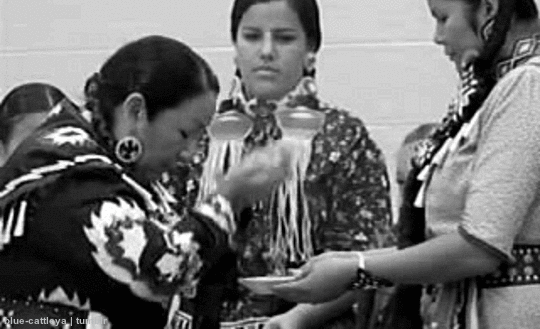
Cultural appropriation occurs when cultural practices are taken out of their original context and misused by outsiders. Cultural appropriation is different from cultural sharing, which occurs naturally in any multicultural society. Eating at an Indian restaurant is not cultural appropriation. Wearing a bindi when you don’t understand its significance in Indian culture is.
Cultural appropriation is a huge issue in modern witchcraft. When you have witches using white sage to “smudge” their altars, doing meditations to balance their chakras, and calling on Santa Muerte in spells, all without making any effort to understand the cultural roots of those practices, you have a serious problem.
When trying to understand cultural appropriation in witchcraft, it’s important to understand the difference between open and closed magic systems. An open system is one that is open to exchange with outsiders — both sharing ideas/practices and taking in new ones. In terms of religion, spirituality, and witchcraft, a completely open system has no restrictions on who can practice its teachings. A closed system is one that is isolated from outside influences — usually, there is some kind of restriction on who can practice within these systems.
There are different reasons a system might be closed. Some systems require a formal training and/or initiation, but there is no restriction on who can be initiated. Reiki and some forms of Wicca operate this way. (All other forms of Wicca are completely open.) Some systems are closely tied to a complex set of cultural beliefs that may not be fully understood by outsiders, so they are closed to people outside of that culture. Kabbalah (Jewish mysticism) is an example of this. Some systems require a family lineage, so you must have been born into the system to practice within it. Zoroastrianism and some forms of traditional witchcraft fall into this category. And finally, some systems are closed as a kind of self defense, usually because they have been the target of persecution from outsiders — keeping the system closed is a way to preserve beliefs and practices that might otherwise be lost. African Diaspora Religions fall into this last category.
If a belief or practice is part of a closed system, outsiders should not take part in it. It really is that simple. If you aren’t Native American, you should not be performing smudging ceremonies. If you aren’t Jewish, you should not be practicing Kabbalah or working with Lilith as your “goddess.” If you aren’t Black, you should not be practicing Hoodoo. You get the idea.
On a similar note, just because a system is open does not mean you can do whatever you want with its teachings. You should still make a point of educating yourself on the system you are practicing and take care not to take things out of their original context. Some forms of Shinto are open, but you wouldn’t involve the kami in a Wiccan- or pagan-style ritual — Shinto has its own rules for ritual, which are very different from Western paganism. If you feel called to work with a cultural system you are not already part of, you need to be willing to put in the work of respectfully learning about and preserving that system.
It is impossible to appropriate a dominant culture. For example, in the United States, white American culture is treated as the default. There is tremendous pressure on all other cultural groups to speak English, dress like white Americans, and act like white Americans. White American culture has deep roots in Protestant Christianity, and these religious influences are enforced through social norms and sometimes through laws. Many businesses are closed on Christmas and Easter, and I live in an area where it is illegal to sell alcohol on Sunday mornings. White (Christian) American culture is literally being shoved down everyone’s throats all the time. A non-Christian immigrant wearing a cable-knit sweater, taking Sundays off work, or celebrating Christmas isn’t cultural appropriation, because they are expected to adopt these elements of the dominant culture.
It is also impossible to appropriate your own culture, even if you weren’t raised in it. For example, a Latinx person who decides to learn brujeria does not need anyone’s permission to do so. That practice is a part of their cultural heritage.
Dead cultures are a gray area, but the general consensus is that you cannot appropriate a system that isn’t connected to a living culture. For example, Hellenic polytheism is very different from modern Greek culture. A non-Greek person practicing Hellenic polytheism isn’t appropriating Greek culture, because that religion hasn’t been openly practiced in Greece for thousands of years. The same goes for many other types of reconstructionist paganism (paganism based on recreating ancient beliefs and practices) such as Kemetic (Egyptian) polytheism, Celtic paganism, Norse paganism, etc.
This isn’t to say that you shouldn’t still make an effort to be respectful of the cultural origins of these religions. If you worship the Kemetic gods, you should probably educate yourself on at least the basic history and philosophy of Ancient Egypt. You should probably try to be faithful to the ancient beliefs in your practice. But you don’t need any sort of initiation, because there is no direct connection between the ancient religion and modern reconstruction.
So How Do We Avoid Appropriation?
Know the difference between open and closed systems, and respect if a system is closed.
If a system is open or only partially closed, try to find a teacher or mentor who is already a part of that system. If an in-person mentor isn’t possible, try to find books and other resources created by people who are actually part of that culture.
Only use items or practices in your witchcraft if you have a good understanding of their cultural, religious, and/or spiritual significance.
If a member of a culture or magic system tells you their system is closed and asks you to stop using it, listen to them.
Educate yourself on how cultural appropriation contributes to systemic racism and other social issues.
Don’t try to sneak around culture appropriation. If you burn white sage to cleanse your space, you are still appropriating Native American spiritual practices (and contributing to the overharvesting of an endangered plant), even if you don’t use the term “smudging” or appropriate the entire smudge ceremony. If something is not yours to practice, leave it alone.
Learning about other cultures is not the same as cultural appropriation. Here’s a personal example: I live fairly close to New Orleans, and I think New Orleans Voodoo is a fascinating tradition. When I visit, I like to speak to local Voodoo practitioners and learn from them about their practice. That being said, I recognize that I am not a part of that practice, and I’m not about to start incorporating elements of Voodoo into my personal practice.
As a white woman, my track record is not perfect when it comes to cultural appropriation. When I first started my witchcraft journey, I burned white sage and worked with the chakra system. I didn’t know any better, and these things were presented to me as if they were open to anyone. But now I do know better, and I’m making a conscious effort to avoid appropriation in my practice.
I’m also trying to do better for new witches just entering the world of alternative spirituality. It’s important for us to talk about things like cultural appropriation so that baby witches know from the beginning what the issues are and why they matter.
#baby witch bootcamp#baby witch#witchblr#witchcraft#witch#wicca#wiccan#cultural appropriation#smudging#sage#hoodoo#voodoo#vodun#african diaspora#hinduism#chakra#chakra healing#shinto#kaballah#magic#magick#paganism#pagan#my writing#mine#spiritual#spirituality
4K notes
·
View notes
Note
before I ask my question, I just wanted to say thank you so so so much for keeping up your blog and consistently giving out information where its readily accessible!!!
maybe this will make me sound like an idiot but to preface, I’m a mixed filipino american. My mom is filipino and some chinese and my dad is some sort of european and puerto rican. i was wondering, in your opinion, do you think it’d be okay for me (eventually) work with diwata and anitos? And how can I start? Ive been trying to communicate with my ancestors and I’ve been looking for books to one day buy (im extremely broke so your blog and any filipino witches i come across is all the info i can get) but i honestly have no clue where to start other than with my ancestors (weird dreams lately but nothing ancestor related i think). i took a DNA test as a gift and it pointed, predominantly, to the Western Visayas so im assuming i should study more on pre-colonial Bisayan culture (my lolas from iloilo so it makes sense i guess) but i also know that “blood quantum” is a colonizer concept so i dont wanna rely on it too much :/ sorry to ramble but pls help lol
First, I'd like to say thank you for following the blog! It really does mean a lot to me to hear from others over the years on how much my blogs have helped them learn about our history and culture.
Now as for working with our diwata and the anito, that is completely ok. The whole blood quantum thing among some Filipinos I honestly don't agree with. As long as you have a family member who is Filipino, you are Filipino regardless of your "percentage" and of how you look. If you have Filipino blood in you, the ancestors are there with you. Even if you weren't raised within Filipino culture or a Filipino household because your parents never brought you up in it, or you are an adoptee like some I've met over the years. Your ancestors are your ancestors regardless. They see you and know you and that is all that matters.
Now there really isn't any book focused specifically on reviving our precolonial beliefs and practices. Yes, some did survive and some even blended in with a form of Folk Christianity in the Philippines. You can see many of the older practices and beliefs still alive, but they have been replaced with Catholic imagery and Saints.
But, in regards actually believing in and worshiping our old deities, doing rituals dedicated to the deity, or even some rites of passage like the Tagalog first menstruation rite of passage, or making carved figures dedicated to the diwata and anito, or performing maganito/paganito or atang to the diwata and anito, majority of Filipinos don't do this, or even know it.
So for being an Anito Reconstructionist, which is a label I personally use for my spiritual beliefs and others have adopted, there really isn't a book for it. A Reconstructionist in other ethnic spiritual paths, such as the Celtic, Roman, Aztec, Kemetic, Greek, Norse, etc., are those who look at historical records to try and piece together what was once practiced and believed in prior to Christianity. Over many years, these different spiritual paths have eventually come together, formed a community, and have resources like books and teachers. They have had the time to do all the research and put together a more formal spirituality based on those Pre-Christian beliefs and bringing it to the modern day where they have hundreds to thousands of people who have gone back to those beliefs. With some, they have even created temples, shrines to their deities, and even have celebrations.
Unfortunately that is not the case for us. However, due to the growing interest in our precolonial beliefs and practices over the years, I can see Anito Reconstructionism growing within the next several years. It already has, with many people actually trying to learn more about these beliefs and our old deities. The amount of people of people I've seen and talked to who have expressed their interest to reclaim these precolonial beliefs and practices is nothing compared to 10 years ago when it was hard to even find one or two people who did.
It is why I've been writing this book for a few years now dedicated to helping others in wanting to reclaim our precolonial beliefs and practices as a starting point in their research. For now though, I always recommend those who are starting to simply just read the historical texts. Grab a notebook and write down notes. Organize your notes into deities, rituals, how to make an offering, any prayers to a specific deity, how to set up an altar, etc.
Seeing as your family is from the island of Panay in the Western Bisayas, like my moms side are from, I would start with looking at the Bisayan precolonial beliefs and practices. A really good reference is reading Francisco Alcina's History of the Bisayans (1668). Volume 3 is available online in English which you can find here. Volume 3 goes into a lot of detail in the beliefs and practices. The Boxer Codex, if you are able to get a copy of the English translation, is also really good reading material.
Getting Started:
In terms of getting started, keep in mind that there is no one monolithic belief system or practice in the Philippines. Before there ever was a Philippines, we were different nations with different beliefs and practices. It is important to know your ethnic groups beliefs and practices and know their history. For example, I am Bisaya (Akeanon specifically) and Tagalog and that is what I work with. Others who I know follow the Bikolano, Kapampangan, or Ilokano beliefs. Though there are some similarities, each ethnic group had their own set beliefs and practices.
I often tell people that you can't just mix and match between them. For example, though I work with both the Tagalog and Bisayan pantheons, I wouldn't dare do a ritual offering to both a Tagalog or Bisayan deity at the same time. It's always separate. You also can't combine 2 similar deities together from different ethnic groups just because they share similar attributes. It's just rude and disrespectful.
Start out small. Set up an altar dedicated to your ancestors. If you have any family members who have passed, put a photo of them on the altar. Leave offerings of rice cakes such as suman, food like chicken adobo, or even a cup of drink such as tuba, lambanog, or even Red Horse beer. But if you can't get access to an alcoholic drink either because one you are a minor or 2 it's not available where you live, you can simply replace it with a non-alcoholic drinks like coconut juice. Get a coconut shell or a seashell to either place these offerings as bowls/plates or even use them to put your kamangyan or incense.
Then start researching how our Bisayan ancestors worshiped and practiced. Study the history and read historical accounts, books, and articles about them. Write down what you have learned on these precolonial beliefs and practices and reconstruct or revive them. This is what Polytheistic Recinstructionists do. I have listed links to these texts here.
Ask questions to your family, particularly your elders. See if they know of anything or if they can share some traditional practices and beliefs they know of have heard of. You would be surprised how, despite some families being really religious, many still believe in the spirits, do some form of ancestor veneration, believe in omens that are being told to you by the ancestors or spirits, etc.
If you can, try to go back to the Philippines and see your family's ancestral home, see where they grew up, etc. Ask about family stories and folk stories. For example, my mom grew up in Aklan and has always told me stories of the aswang and certain omens. She also constantly talks about the mischievous "little people" who play tricks on you (for example putting something down like your keys and then it goes missing, until you find it again somewhere else). In the Western Bisayas, they are known as kama-kama. There is also a story of how her grandmother's cat visited her during her wake. The cat was missing for years, but it came back and stayed sleeping on top of the casket for days before it left. My mom told me that it was the cat paying their respects to her grandmother.
Keep in mind also and acknowledge our indigenous communities who have kept their beliefs and practices. Don't try to take them into your own. I have seen people cherry pick things from the Manobo of Mindanao or the Kalinga in the Cordillera, which is just disrespectful. Many of the IP, though some still have kept their beliefs, it isn't the most important aspect to them. What they are most concerned about are other issues such as losing their homes due to occupation by oil or logging companies, other settlers such as the Tagalog and Bisayans (especially in Mindanao), getting targeted as "rebels" by the Philippine military and often getting killed. But, by cherry picking beliefs especially of the IP groups, it's just disrespectful.
I will be teaching classes on Anito Reconstructionism soon and will have my first class possibly at the end of the month or next month. I decided to do these classes seeing as there is a growing community who are interested, but don't know where to start. I'll be doing a proper announcement on these classes real soon so look out for the announcement and hopefully you will be able to join!
#filipino#diwata#anito#anito reconstructionist#polytheist#polytheism#precolonial philippines#faq#question#long post
92 notes
·
View notes
Text
Patrilineal Jewish girl, Sephardic culture
@feminismandsunflowers said:
hi! my character is a patrilineal Jewish girl in the usa, she didn't convert but still considers herself Jewish. her mom is Christian. her g-grandmother/father were undocumented refugees from Europe (antisemitism) and her g-grandmother was v closed off abt her origins but my character's dad thinks she said something abt being Sephardic. her fam has a fair amount of Sephardic culture. but could she claim Sephardic culture to any extent if they don't know? trynna get a handle on how to present her.
"My character's dad thinks she said something about being Sephardic"
and
"her fam has a fair amount of Sephardic culture"
are inconsistent statements.
The first statement sounds like the only indication Dad has of which Jewish culture they are is a statement he's not even sure about ("thinks"?) and the second statement sounds like Dad considers himself Sephardic and practices Sephardic traditions.
So, to me personally, this would depend on the level of Sephardic cultural practice she grew up with. If she grew up with those traditions and Dad sharing them with her, then yes, that's who she is. If Dad isn't even sure he's Sephardic and what she practiced in her upbringing wasn't distinctively Sephardic in any way, I have a hard time seeing why she should claim the culture if she's not even sure if her ancestors were Sephardic.
Disclaimer that the Reform position is to 'count' patrilineal Jewish people as long as they were raised in the traditions. This is not the Orthodox position but I am Reform.
--Shira
I'm also a bit confused about this situation. I think it would be helpful if you start by specifying where in Europe the family comes from and what anti-Semitism they were fleeing from. I'm Ashkenazi and not the most knowledgeable about Sephardi history, but as far as I know it wouldn't make sense for a Sephardi family to be seeking asylum from the pogroms in Russia or Poland, for example. I guess it could make sense if they were from Spain, France or Italy, but we would have to know more, and I'm wondering if this isn't a 'trace your logic' situation. Why do you want them to come from Europe? *Quickly cracks open a Claudia Roden book* Sephardi Jews have origins in many North African and Middle Eastern countries, such as Morocco, Algeria, Libya, Syria, Iran and Iraq just to give a few examples. If you want Sephardi characters, why not represent those cultures instead of re-hashing the same Euro-centric Jewish stories?
In terms of whether she could claim Sephardi heritage of any sort if they don't know, I'm interested in what Sephardi followers think. Religion-wise, I don't think there would be too much of a problem with it. Yes, Sephardim are more lenient on some things and stricter on others, so by picking the wrong one she may be following some of the rules wrong, but that's just a matter of tradition really. If someone was a ba'al teshuva and had no way of finding out which population their family came from, I imagine a rabbi would advise to choose one and stick to it without worrying too much about which one. I don't know 100%, though.
Culture-wise, I don't know if this is what Shira was getting at but I wonder if it would be cultural appropriation due to Ashkenazi Jews being more likely to be white-passing and getting more media representation. Is Jewish lineage enough to claim Sephardi traditions and culture, or do you need to know for sure that you're Sephardi - that will be for Sephardi followers to decide.
To build on Shira's disclaimer:
I'm Modern Orthodox and I would describe your character as someone who is not halachically Jewish, i.e. not in Jewish law. In most situations, this would be a technicality for me and I wouldn't hesitate to treat her as Jewish if she identifies as such. In particular, with her family history it makes sense that she considers herself ethnically Jewish and the legacy of discrimination is part of her identity - that's not something we can erase or overlook. It would be different if my kid wanted to marry her, I think (not that I ever plan to be one of those parents who would disown their kid or something for marrying out but I'm not going to pretend I completely wouldn't care, either). Then I might be hopeful that she may formally convert, especially if she had always lived as Jewish anyways.
Other things she may experience if she hangs out in Orthodox circles: a few people might act like jerks and be iffy around her like she's 'not really Jewish', probably the same people who are pro-Trump and mansplain why women's exclusion from parts of Orthodox worship is actually protecting us. On the subject of women's exclusion, if you have any male characters with a similar parental background, they can't get an aliyah in shul or count towards a minyan - the character you're describing couldn't anyway, though.
Hopefully if your other Jewish characters are nice people, they take to heart the teaching that you should rather throw yourself into a fire than humiliate someone else in public. When I was a student, there was a patrilineal man in our community who once entered the shul just in time to be the tenth man, making a minyan. A Chasidic man in the congregation quickly stood up and said "Oh no, I left the gas on!" and left. That way no one had to make a whole song and dance about the other guy not being allowed to count. Patrilineal Jewish followers, feel free to add more!
-Shoshi
I'm going to add some things here, about the terms Sephardi and Ashkenazi, that I think might be partially tripping the author up.
Sephardi and Ashkenazi are terms used to describe the traditions that a person follows. Those traditions are heavily linked to the land where they rose up, and to parentage, as people are typically encouraged to follow the traditions they grew up with. However! Converts exist, and converts are usually encouraged to join in on the traditions in their community. So, as an example, a person can be from anywhere in the world, of any racial or ethnic background, convert in a Conservative synagogue, and follow Ashkenazi traditions. A person can be from a place that is usually seen as very Ashkenazi-heavy, like Germany, and then end up converting in an esnoga (synagogue) in Spain, and practice Sephardic traditions. Either of those converts might have children, and those children will take on their minhagim (traditions), and will be a part of the culture their parents joined just like their parents were.
It can be confusing for many people because the terms are so often conflated with ethnicity, which is in turn conflated with genetic lineage. The trouble is, the groups they describe are older than the modern, western conception of race, and ethnicity, and we don't completely fit into these categories. Ashkenazi Jews don't all come from Europe, even their ancestors might not. In the US it's been estimated that at least 12-15% of American Jews are Jews of Color, and those JoC are very, very often Ashkenazi. Some converted, some didn't, but they are still following the traditions, and are still Ashkenazi.
So it's fair to say that the traditions of Sephardim grew in the Iberian peninsula, and North Africa, but they also moved along with those Jewish people as they dispersed, and were expelled. Jews from Portugal fled to the Azores, but also to the Netherlands, where there is a large Sephardic presence, right in the middle of a space that is assumed to be all Ashkenazi! Scores of Jewish people from Morocco moved to France. Then too, people marry folks from other groups. Often they will pick one family's traditions to follow, but sometimes they mix and match, and sometimes they end up moving somewhere else and taking on those traditions.
Because so many people have traditions that match their genetic background we've begun using the term Ashkenazi to mean strictly white, European Jewish people. Sephardi we have taken to mean strictly white, Iberian Jewish people (which doesn't even include the massive number of North African Sephardim). We've forgotten entirely to cover Mizrahim (a tradition associated with the Middle East), or the Romaniote, or Cochin Jews, or any number of other groups. Yes, genetic background accounts for a large portion of those people, but it doesn't map completely, and it's important not to forget that.
This complexity is why the statements Shira drew attention to:
"My character's dad thinks she said something about being Sephardic"
"her fam has a fair amount of Sephardic culture"
Don't make sense. You would know you are Sephardic, because it's something you do first, and may be, secondarily, directly linked to something in your ancestry.
Finally, since you are showing a patrilineal Jewish person, I really encourage you to show them consistently engaging with their Jewishness, and actively participating in Sephardic culture. I'm the Conservative one here, and my movement, and Sephardi tradition (there are no movements for Sephardim, just varying observance) don't allow patrilineal descent to give a person Jewish status halachically. This is not something I endorse. Patrilineal descendants really struggle outside of Reform communities, to be seen as Jewish, and often to just be treated with respect, so it's important that you give this character every opportunity to participate, and show who they are.
-- Dierdra
161 notes
·
View notes
Note
Considering your headcannon about Andrew kinda being a victim blamer to a certain degree, do u think it ever causes conflict with neil? (Or others) I think it's an interesting hc and it feels surprisingly fitting but I can't decide whether I think Andrew would voice these opinions or not... He is very straightforward and blunt but idk if he would just recognise that its likely to cause an argument and 'it wont change the past anyway so what's the point?' kinda thing.
(Just wanna clarify that I like Andrew btw lol, I just also think he has flaws and this is one of them, so Andrew stans don't attack me)
Short answer: yes, he brings it up sometimes.
Long answer where I show examples:
I don’t think he ever blames victims more than perpetrators for anyone except himself. I also don’t think Andrew thinks of it as “blame” but more like actions that were taken and actions that weren’t. If Andrew was too drunk to fight back in a shitty bar he would think “I will not allow myself to ever be drunk enough where I can't fight some asshole back, not ever again” and moves on. Andrew hardly even ever allows himself to relax his shoulders even, and when he wakes up, he wakes up swinging. His mind is very ‘fight’ centric, it’s how he was socialized and raised. I think it changes depending on circumstances as well.
(I will continue to use the word blame for clarity’s sake however)
Sober Andrew is a lot less talkative than manic Andrew, and manic Andrew definitely said insensitive and unwelcome opinions just to see reactions. Manic Andrew also lets his opinion be known to see if anyone is listening or cares as well, and sober Andrew does so as well, but in a more mousetrap way, waiting to see how the other person will react for a reason and to be read, rather than manic Andrews ‘just because I need some entertainment’ reasons.
Overall I think Andrew wouldn’t really voice these opinions and people definitely don't care to hear them, but they can sense Andrews overall apathy and don't appreciate that either.
I think Andrew would bring up his opinion scarcely, but it would come out sometimes, and it’s definitely not appreciated. Andrew thinks “if only I was stronger” about himself, and that's what he plans to do, get stronger. So thanksgiving hit him hard because not only was he re-traumatized in more ways than one, he has lost his belief that he is stronger than before and that's all he needs. He got buff, joined exy, carried knives and made sure no one wanted to be closer than a few feet to him, and when they touched him he made sure they learned he did not like to be touched– at all. I believe he still holds onto his “if only I was stronger” mentality still even after Thanksgiving, he re-establishes the foxes fear of him by punching and though violence, its what he knows. Andrew’s least favorite reaction is pity (and so is Neil’s).
Andrew isn’t the type to roll his eyes at anyone but maybe Neil and a few others, he’s very selective with who he lets see his more visible expressions, but overall he doesn’t have the energy in him to emote when he disagrees or what he thinks. He knows it won’t change the past, so he usually doesn’t bring his thoughts into it, but sometimes when he’s annoyed or angry or in an argument he will, and it definitely changes the argument from an argument to more of a fight.
I think it comes up most often with Neil since Andrew is comfortable enough to share his opinion with him and let it be known, and it’s not always appreciated. Kevin has definitely heard some of this even in canon from Andrew too. Andrew sees things very black and white, so when Kevin says “I can’t” because he's scared, Andrew says “you can, and you will”. Andrew looks at Aaron and sees an almost weaker version of himself who never learned how to hit his mom back. Andrew doesn’t understand those who don't hit back, not after Cass. He believes if someone isn’t hitting back, there should be a reason, and not a sentimental one, otherwise its weakness. And he sees this because its what he thinks of himself, and how he was willing what he was going through for Cass. He thinks his past self should have known better and been stronger, but it's too late now so whatever who cares– or that's what he tells himself. Andrew doesn’t blame Neil’s mom for hitting him necessarily, but he does think “and you didn’t stop her.” and the silent “and you didn’t stop loving her” is there too, and its something that him and Neil do fight on. Andrew also frames things in the “Neil will get himself killed,” way that most people jokingly say, but Andrew means more “undeniably Neil provoked someone, and it’s partially his fault.”
I think Andrew doesn't think it's Nicky’s ‘fault’ for getting hate-crimed behind Edens, but he does think Nicky was not paying attention and didn’t read the room like usual, and possibly could have avoided it, but what's done is done, and it never comes up. And Andrew is overall anti-family and how they can have power over you, so he definitely blames Nicky for letting his feelings get hurt and heart get crushed by the same parents who sent him to conversion therapy. He thinks “you should know better/what did you expect” and voices this in book 2 to Neil about the Thanksgiving dinner invitation.
With Aaron, I can see it coming up. When him and Aaron fight, it usually turns into Andrew shutting down and shutting him out and Aaron growing angrier now that he’s seen Andrew shut down, and he can't break through with his anger, and will then push hard before retreating himself and then pushing away back. And yes, the fight is about his mother, in a very similar way to Neil. (Neil hates this, because he sees it as different, his mothers circumstances different, but Andrew does not.)
I think if Allison were to be crying about being mugged and see Andrew’s blank face over Renee’s comforting shoulder, she would just spit out a “fuck you,” and he would shrug, knowing he has no comfort to offer her. Being mugged to most people can be very traumatizing and scary, Andrew grew up in foster home after foster home in Oakland, if he were to mug someone he would look for an Allison, someone who dresses well and likely has a lot of cash on them, multiple credit cards, you could get pretty far before they're all canceled. Andrew learned as a kid how to dress and look, so people don't mug you and if they try they don’t get anything, it's a pretty common city skill. Andrew also blames Allison for hitting Aaron as the reason why he choked her against the asphalt. “She knew what would happen.” He doesn’t think he didn’t not do those actions, but he thinks: cause → reaction.
Andrew thinks, ‘yes I took Matt to Edens, but he was the one who said yes to the drugs, his sobriety was just as weak as I proved it to be.’ Interestingly, Matt actually agrees with Andrew, thinking his methods were harsh but effective.
Besides Matt, Renee is the only one who doesn’t fight him on his opinions, I’m sure she sometimes agrees (or part of her does) and other times she politely disagrees and doesn’t let it rile her. He talks to her more though, and gets to hear his opinions about said things much more often than the other foxes, especially with how he likes to debate her and bait her good christian persona with his own personality, especially because Renee is ‘just like him’ deep down.
He doesn't blame Seth for dying, that he knows is partially Neil’s responsibility but overall Riko who actually did the deed (or hired people to).
As for Dan, I can’t think of any examples rn, kinda a lame note to end on, but this is how it ends.
49 notes
·
View notes
Note
You weren't fuckin kidding man. Someone saw that ask I sent you about how people assume I'm culturally Christian because I'm white and live in the US and they decided that actually I'm a stupid idiot who had "an explicitly Christian upbringing" and is just too dumb to realize that I'm part of the "oppressor class." It's not that I didn't believe you when you said how bad it was, I had just never personally experienced it before because I don't talk about religion except on very rare occasions. But these people are fucking unhinged!! Apparently the bar for being culturally Christian is as low as "has interacted with or been affected by Christianity at some point." This shit is wild!
Now I feel like I have to avoid anything that might be taken and misconstrued as me being "culturally Christian." Like I feel like I can't say omg anymore because it has "god" in it.
Oh yeah, it is absolutely wild lmao.
I think there are two pretty dominant ways of looking at cultural christianity right now:
You either Are A Cultural Christian or you are not, or;
Cultural Christianity is something that impacts an entire society, and that anyone within it can express.
Under the first one, they have to actually define who is culturally Christian, and what the bar for that is; which means we get different conflicting models of how to decide who Counts as a cultural Christian. So then we get "you're culturally Christian if you..."
Are a Christian
Were at any point a Christian
Were raised by Christian family
Live in a Christian-dominated society and were not raised under any other (non-Christian) religion
Live in a Christian-dominated society but "come from a Christian background"
Live in a Christian-dominated society but are not religious
Participate in any aspect of Christianity, even in a non-religious sense.
Or some combination thereof.
Each of which kind of falls short of capturing the full picture or being much of a useful term. Obviously Christians are Christian; we don't really need another term for that. But ex-Christians can convert, can't they? So is it just ex-Christian atheists, or are, for example, Jewish converts "still culturally Christian"? So can people who were raised by Christian family; again, does this only apply to atheists? What kind of atheists does it actually apply to?
And the last groups consists of a huge variety of people: again, atheists can raise atheists or have been raised by atheists, often going back multiple generations (I'm part of the third generation of atheists in my family- on both sides).
Is the deciding factor here whiteness? I absolutely agree that white people are more likely to be hostile toward other cultures and the religions generally associated with them; but that's not because white people are Christian (Black Americans, for example, have a long, complicated history with Christianity; from forced conversion to a modern unique relationship with their own Christian beliefs and practices, all of which should be defined by them). That is, imo, an extension of racism & white supremacy- which is itself very tied into Christianity.
And as for people who participate in Christianity- what about cultural conversion/erasure? What about mixed religion families; half-Jewish and half-Christian families that celebrate both sets of holidays, for example? What about people who "celebrate" only because family does? What about people who are forced by their families, or others, to participate?
Again, is "cultural Christianity" just something that applies to atheists? And if so, why?
Either we need a perfect definition and delineation that can adequately, respectfully categorize everyone from every complex experience and background and acknowledge that people change categories entirely, often by their own choice; or our entire culture is influenced by Christianity, in which case anyone can theoretically be influenced by it regardless of background, and atheists are not "more Christian" than anyone else by default.
It needs to be a broad and fluid umbrella, or we need a different one entirely.
I've seen @cleverthylacine suggest that we should talk about it like "passing", which I can honestly get behind; people who "pass" as Christian aren't necessarily gaining privilege, but depending on how congruent that external perception is with their internal reality, it can be a much smoother experience than those who are openly antagonistic, or inherently oppositional to Christianity are.
i.e. a Jewish person who asks for their holidays off is not passing, and is challenging Christianity in a way that is going to lead to experiences of antisemitism, specifically.
An atheist who celebrates Jewish holidays and asks for them off from work will likely experience some, or all, of the same.
An atheist who happily celebrates Christian holidays isn't going to face much hardship at all- or likely even notice that they'd be subject to opposition if they didn't.
An atheist who quietly avoids celebrating Christian holidays is going to have some internal struggles and awkward, uncomfortable interactions with Christians who want them to do otherwise.
An atheist who openly, vocally resists celebrating Christian holidays- and even goes as far as to advocate against their workplace holding celebrations for them- is going to face a lot of open opposition and bigotry from Christians in their workplace.
It's based more on action, personal relationship to the religion, and individual choices/situations/experiences, and avoids treating the "passing" experience as if it's inherently a privilege- or inherent to a specific group. And it allows a lot of room for those conversations around who exactly is Presumed Christian (white people, mostly), what that means, without assuming everyone from a certain category is going to have the exact same experience forever.
73 notes
·
View notes
Text
okay I have to do this today because even I wouldn’t do it after the godforsaken finale airs, and it’s basically my specialty and I did spend like an hour thinking about it last night while washing dishes. Definitely partly inspired by @words-writ-in-starlight‘s insightful post on everything Supernatural did wrong, and apologies in advance to all the characters for dragging them into anything related to Christian mythology:
Wei Wuxian’s parents die in a house fire when he’s 6(? I refuse to look anything up) months old
Jiangs are a hunter family I guess? That whole disaster of a family dynamic, except WWX dips out at some point to be idk an environmental activist bc at the time, that seems like the larger threat to the whole world. “Mom and Dad went on a hunting trip and they haven’t come back”, “bitch” “jerk”, 2 brothers in a beat-up old car, you know the drill
Jins are also an old hunting family, but more Men of Letters energy - they have a fancy bunker and do research and avoid getting their actual hands dirty. Jiang Yanli ducked out of the active hunting life a few years ago to be happily married to her peacock and settled down with a baby and she’s fine. We’re not going to bother Yanli. She’s safe and happy and doesn’t need to involved in any of this
so, WWX is the demon blood child developing exciting new abilities like telekinesis, mind control, exorcising demons by sheer force of will...etc, and Jiang Cheng is the Righteous Man. Lucifer, Michael, etc.
s1-3 probably proceeds more or less as spn canon...which I more or less remember...by the time they find their parents at the end of s1, Jiang Fengmian is...ugh, we probably shouldn’t kill him offscreen, I mean, we should probably meet him before he dies. I guess. Madam Yu lasts longer because I’m way more interested in her. But we do know that both Jiang parents are totally inclined to fling the boys into a metaphorical or literal escape boat and go hold the line for as long as possible, so...that’s spn energy...
Xue Yang is the one who’s like “fuck yeah, demon powers” and opens the gates of Hell, because I want him to have nice* things
*nice for Xue Yang
from characterization rather than memory, I’m 90% sure that Dean tried to hide his crossroads deal from Sam, but Jiang Cheng does it...better. I think it does come out, though. Right before the hellhounds do.
here’s where it starts to go farther off from spn canon. Jiang Cheng crawls his way out of the grave, gets stalked by a menacing presence that explodes windows for an episode, incidentally can’t find WWX...*Lan Wangji voice* “I’m the one who gripped you tight and raised you from Perdition” (a baller line then and a baller line now)...and then the next episode starts with them all awkwardly standing around, and JC is like, “ok well let’s go find my brother then”, and you think there’s going to be an mdzs-riffing JC+LWJ Roadtrip To Find WWX...and they’re immediately attacked by like a dozen demons
in fact, the first time we see WWX in s4 is here, wherein he goes toe to toe with an angel and...holds his own. that’s new and terrifying! also is leading a squad of demons??
because here’s the thing: for the last 3(?) months, there’s been war in hell
because unlike Some People Mooses, upon finding out that his brother’s soul was legally nearly-owned by a crossroads demon, heir-apparent-to-Satan!WWX went, “actually fuck that” and kicked open the door of Hell (metaphorically, not loosing any demons this time) and was like, “who do I have to beat the shit out of to get a specific crossroads contract around here”
this did not work, obv. He didn’t know until it was too late, Lilith had already snapped up the contract, etc. etc.
obviously he also tried to offer himself instead, and got rejected for some reason
Since Jiang Cheng died, however, there’s been a war for control of Hell. Leading one side, Lilith, the Original Babe, who wants to break all 666(?) seals keeping Lucifer bound and in the meantime, break the Righteous Man so Heaven won’t even have Michael’s destined host ready for the Final Battle. Leading the other side, Wei Wuxian, infamous upstart, who wants to rescue the Righteous Man and restore him to life, tear Lilith’s guts out through her nose, and also stop her from doing the Lucifer thing because Wen Qing explained that yes, that’s a Thing, and it’s Bad.
Wen Qing! I’ve decided to combine Bela and Ruby’s roles and let WQ be both the cool badass example of how demon deals can go Bad and the demon deliberately leading our heroes astray for most of s3-4. Wen Qing is a very new demon; she used to be some sort of herbalist/witch but then she sold her soul in a crossroads deal to cure her brother of some lingering illness. 10 years of happiness and then boom, hellhounds. WQ is so obviously competent, though, that they (Lilith, I guess?) immediately offers her a job, with the promise threat that gee, that’s a nice brother you’ve got there, even with his Designated Chronic Health Condition getting all relapse-y. It’d be such a shame if something were to...happen to him...
we find this out at some point in last s3 I guess? some Monster of the Week case involves WN as a witness or something, or possible next victim, and WQ shows up to be A Normal Amount Of Invested In This, while desperately trying to avoid actually interacting with her brother (who thinks she’s dead). YES, the truth comes out; YES there’s a tearful reunion
now in s4, Wen Ning is fine actually, health-wise, bc he maybe made a crossroads deal with Wei Wuxian personally, and Wen Qing may or may not have admitted that she’s supposed to be working for Lilith to get WWX ready to host Lucifer? Or potentially that comes out later, idk. Either way, she’s 100% his top lieutenant in this exciting Hell War they’re waging
[insert whatever the hell (ha) happened plot-wise in s4 of supernatural]
we obviously mix up the relationships, too, bc it’s like, *LWJ internal monologue* I’m too young to remember my brother Lucifer as he was before he Fell, but surely Wei Wuxian is his Heir and Destined Vessel in truth, for he is Charismatic and Charming and Makes Me Feel Things, with his Clearly Feigned Righteous Drive and Compassion for All God’s Creatures and - why does heat keep pooling in the lower abdomen of my vessel when I look at his lips, which I am definitely doing a Normal and Not-Weird Amount - I’m just keeping an eye out for the famed Silver Tongue, and not in any way wondering how it would feel in my own mouth -
it’s actually DEFINITELY plausible for Lucifer to still be released even if our designated Heir Apparent is using his demon powers to his full potential and no one’s lying to each other about their motives. You just need to let Lilith be more scary too, and especially bc by “no one” I mostly mean Wen Qing; the angels are still totally hiding the fact that they, too, want to jumpstart the shit out of this apocalypse. LWJ decides at the last minute that that’s a bad idea actually, gets himself discorporated to send JC to intercept WWX because he accidentally releases Lucifer, etc. etc. Oh yeah, the boys were def fighting before this, bc JC has actually fairly reasonable concerns about the sort of things WWX is getting up to in his quest to become King of Hell...
SO
...I neither know nor care what happens in s5
it does end with both Lucifer and Michael locked in the cage probably, bc I rather liked that solution. Fuck both of ‘em, basically.
I was toying with the idea that WWX also found Madam Yu in whatever hellish torment she was suffering after making a deal so her idiot son(s) would survive, and she was leading forces for him in the war against Lilith as well. If she came back to life somehow, body and all, it’d probably be compelling if she offered her own body to Michael - bc it’s her lineage! - and we’re all led to believe that she’s, uh, being a bitch and actually wants to risk destroying the world in order to destroy all demons...but then she seizes back control and flings herself/Michael and Lucifer into the Pit, because she’s just That Hardcore?
which means we’d actually have had her around and having characterization for most of s4-5, too, which would be fun
More importantly, it ends with newly crowned King of Hell Wei Wuxian appointing Wen Qing as Queen-Regent and ditching to go on an indefinite honeymoon with his new angel boyfriend (they’re going to fuck for like three weeks straight, then roll up their sleeves and go conquer Heaven in the name of free will), and Jiang Cheng gets to live out his hitherto-unknown-to-himself life’s ambition to be the sugar baby of the Queen of Hell. It’s very Hades/Persephone, except he goes back down to the underworld at least once a month. He gets his own demon squad whom he trains up in all the hunting techniques and it’s gr9. Wen Qing is reforming the crossroads deal process to make it more fair to the humans.
the end
Addenda:
it should go without saying but Jiang Yanli is definitely a recurring character, like, at least once a season there’s a filler episode where they go to Jiang Yanli’s for dinner and have to get along as a family, and also do the much easier job of defeating some sort of terrible demon that gets loose in the bunker and turns the evening into a horror movie. She’s their main research/emotional check-in person, a la Bobby, more often appearing in later seasons when there’s, uhhh, more to emotionally check in about.
Jin Zixuan is actually a perfectly competent hunter; he’s just a priss and we don’t Like him
we like Mianmian, though. Oh, I guess the official Hunter’s Guild or w/e tries to declare WWX a public enemy on account of the whole “King of Hell” thing and she’s like “actually what if you’re morons and assholes?” and joins hte team in s4 or 5? Yeah.
idk how the 3zun disaster happens in this ‘verse but I do encourage it to be happening in slow motion as a recurring subplot for several seasons. NMJ is a hunter, LXC is obv an angel, and JGY is...I wanna say one of the more human monsters, like a vampire? Or, you know, something that could be born from JGS sleeping with someone/something he shouldn’t have
157 notes
·
View notes
Photo
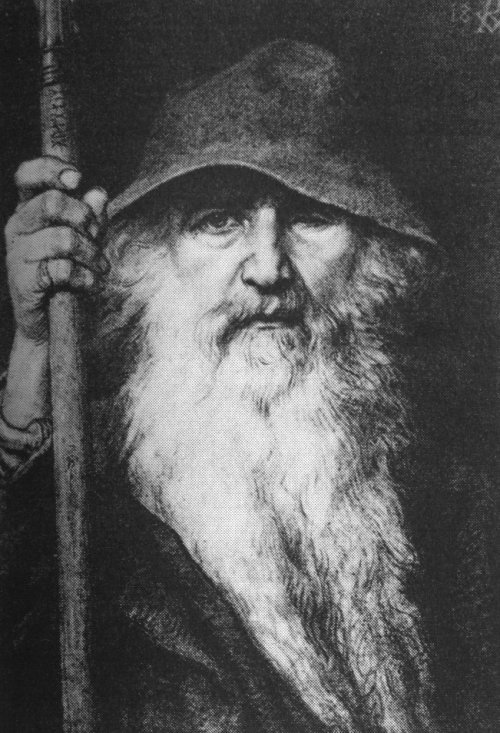
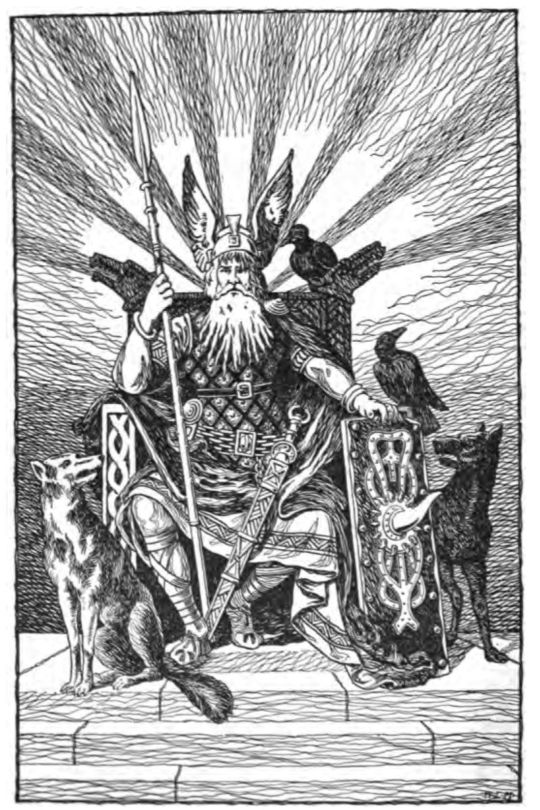
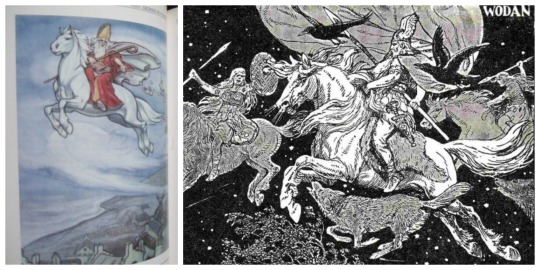
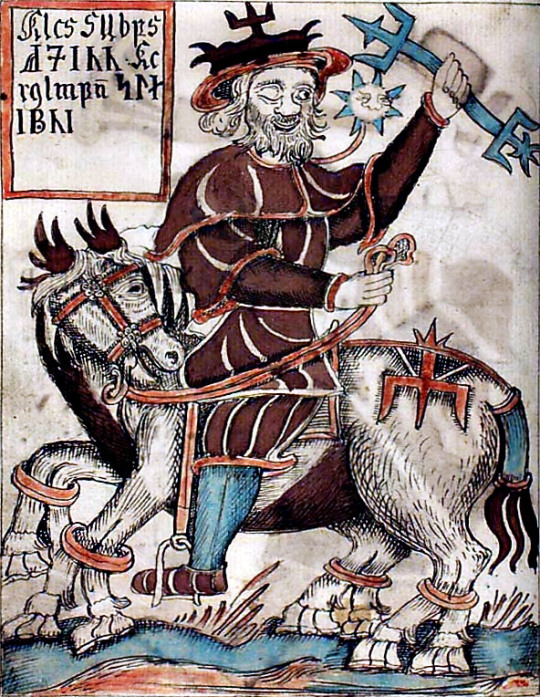
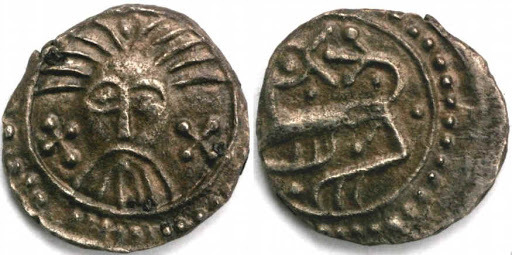
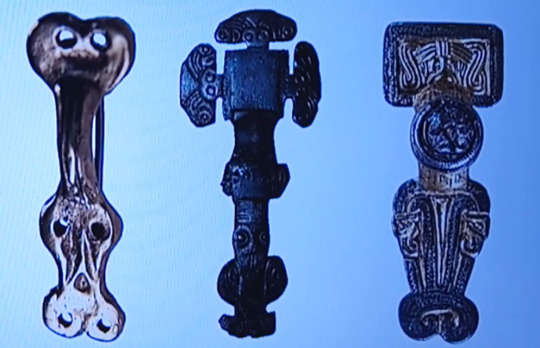


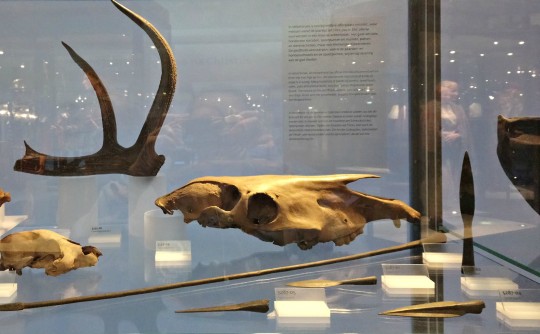
Wodan
It has been more than a year since I published my post on Wodan. Just like with my post on the Batavi, I wanted to rewrite this post as well to include more information about this fascinating God and also add a bit of my own personal experiences with this deity. This group has gained thousands of members since last year so there are also quite a lot who have perhaps missed my previous post on Wodan. I also want to discuss the similarities and differences between Wodan/Odin and the moment when humans started to worship him.
Wodan is the chief God of the Germanic pantheon. He has countless of names in many languages, it would be truly fascinating to try and collect all of his names into one big list. He is the God of wisdom, knowledge, battle, magic, death, primal rage, healing, tricking humans and the runes. Most of our knowledge on Wodan is based on the eddas. Unfortunately the ancient Germanic people did not write anything down about him but we do have archeological evidence for his worship.
His name comes from the proto-Germanic word Wodanaz which means rage. This already provides us with a clue on how the early Germanic people viewed this deity. Interestingly, the Dutch word for rage is woede, derived from the old Dutch name for Wodan, Uuoden>Woen, Weda in old Frisian. The meaning of the word Wodanaz has not changed for the Dutch people in over 2000 years. This God personally holds a very special place in my heart. Through my work with seidr I have come into contact with him several times.
When did the Germanic people start to worship Wodan?
The first written mention of Wodan comes from Tacitus in 98AD. Tacitus describes several Germanic Gods but unfortunately he uses Latin names to describe them. The Romans compared Wodan with their own God Mercury. Why the Romans compared Wodan with Mercury also isn’t fully clear. Both Gods escort the dead and carry a staff but that is where their likeness ends. Curiously, the Romans compared their chief God, Jupiter, with Donar. This is perhaps a clue into the changing roles that Wodan played.
Just because this is the first written mention of him, doesn't mean that the worship of Wodan comes from this time period. The Germanic people didn't write anything down, their religion was passed down to the next generation by telling stories, it's an oral tradition so we still do not know how old Wodan exactly is.
We can look at archeological evidence as well. When do we first see images appearing that look similar to Wodan? I think most of you are familiar with the classic Odin/Wodan images found all over the Germanic world, from Norway to Denmark, Germany and the Netherlands from the Vendel period and early medieval era. But looking at these images provides us with another problem. How can we be absolutely sure that these images represent the same God? Maybe Wodan was portrayed completely different from how we know him now? Maybe a face of Wodan was carved on wood, similar to the wooden statues found in bogs dating back tot he bronze age? Maybe all the early depictions of Wodan have simply been lost in time.
There is however another theory that suggests that Wodan was introduced to the Germanic people by the Saami. One of Wodan's most defining traits is that he is able to wander across all the realms, speak to spirits and gain knowledge this way. Technically this makes Wodan a very experienced shaman. The Saami people were/are practitioners of shamanism. The Goddess Freyja taught Wodan how to practice seidr. Seidr is a mix of shamanism and witchcraft similiar to the shamanic practices of the Saami people.
Another theory suggests that a Saami shaman, called Wotan, simply became deified by the Germanic people. Perhaps he led a tribe to victory after leading them into battle. Another even wilder theory suggests that Wotan was a Celtic druid who was deified by the Germanic people. The only historic truth that can be verified is that the Germanic culture borrowed elements from both the Celtic and Saami people.
Wodan could also have been introduced to the North-western European people during the bronze age by the proto-indo Europeans. The proto-indo European language spread all across Europe and evolved into different languages, perhaps the same happened to their chief God, Dyeus, as well. Almost all Indo-European cultures have a (chief) God who is quite similiar per example, Zeus, Wodan, Perun, Tiwaz, Jupiter, Dagda, Dievas, Papaios, Brahma.
Even if you research all these possible topics deeply, it is still impossible to say when exactly Wodan was a known deity amongst the Germanic people. The Germanic culture developed during the late Bronze age and if you combine all these theories together, his possible origin could lie near the end of the Bronze age and the start of the Iron age. That would mean that the worship of Wodan began around between 1800BC-1300BC in modern day Denmark, northern Germany and North-eastern Netherlands, more than 2000 years before the viking age even began.
However most of the physical and written evidence for the worship of Wodan came from the early medieval ages until the middle medieval ages, the era between 400-1000AD. One example is a fibula found in Heiloo, the Netherlands. This fibula from 7th century Frisia depicts Wodan flanked by two wolves. There are also coins found in Frisia that depict Wodan. More of such fibula, amulets and coins have been found throughout Norway, Sweden, Denmark, the Netherlands, England and Germany.
Written sources outside of the eddas that mention Wodan have also been discovered. This is the nine herbs charm which was written somewhere during the 10th century AD in England. Christianity was the official religion of the English people at that time but it seems that the common people would still fall back on the old Gods in times of need. Here is the charm:
“A snake came crawling, it bit a man.
Then Woden took nine glory-twigs,
Smote the serpent so that it flew into nine parts.
There apple brought this pass against poison,
That she nevermore would enter her house.”
There is also an Old English rune poem that basically explains the futhark. This is the stanza for the ansuz rune:
"god is the origin of all language
wisdom's foundation and wise man’s comfort
and to every hero blessing and hope"
The word Ansuz/Os is used for God. Christians did not use this word to speak of their God so this rune is directly related to Wodan.
He is also mentioned in the Old English poem Maxims I:
"Woden worhte weos" Woden made idols.
The last written record that I want to mention is the German Merseburg charm which I have written about before:
"Phol and Woden travelled to the forest.
Then was for Baldur's foal its foot wrenched.
Then encharmed it Sindgund (and) Sunna her sister,
then encharmed it Frija (and) Volla her sister,
then encharmed it Woden, as he the best could,"
Wodan later became known as Odin in the early medieval Scandinavian world. Wodan and Odin are essentially the same deity but there are some differences between the two. These differences formed over time since Wodan is an older depiction of Odin. Here I tried to list the attributes of both Wodan and Odin in an attempt to show how the early Germanic people viewed Wodan compared to how the vikings viewed him.
Wodan: Skilled sorcerer, God of death, trickster of humans, God of knowledge, bringer of the runes, still has two eyes according to some sources, shaman, primal force of rage, leader of the wild hunt, God of war, God of healing, carries a staff and spear, two ravens, is a deceiver and was a feared God because of his ability to trick humans into death or madness.
Odin: Skilled in battle and magic, God of Knowledge, bringer of the runes, one-eyed, shaman, shapeshifter, dead fighters go to Walhalla to fight for him, God of war, owner of Sleipnir, carries a staff and spear, two ravens and two wolves guide him, more closely related to the Saami culture.
There are still some traditions left in Europe that are linked to Wodan/Odin. Since I am Dutch, I will explain some Dutch traditions: Sinterklaas, the old wanderer on his white horse who rides in the sky and gives presents to children. Midwinterhoorn blazen, the blowing of the midwinterhorn to announce the arrival of the wild hunt, the traditional start of winter. Hanging the placenta of a horse in an oak tree. Sint Maarten, the old wanderer on a horse who shared a piece of his cloak to a freezing stranger. And lastly possibly the game of paalzitten. If you know about other traditions from other countries that are linked to Wodan/Odin, feel free to share them in the comments.
Here are some of Wodan/Odin’s names in different (Germanic) languges:
Proto-Germanic: Wodanaz
Old English: Woden
Old Saxon: Wodan
Old High German: Wuotan
Old Frisian: Weda
Old Norse: Óðinn
Dutch: Wodan/Woen
Old Dutch: Uuoden
English: Odin
Norwegian: Odin
Feel free to expand on this list in the comments.
The reason why I decided to rewrite and post this article today is because Sinterklaas has arrived again in the Netherlands. This was traditionally viewed as the start of the wild hunt led by Wodan. He would ride in the cold dark winter nights through the sky, trying to collect as many of the dead as possible. If you were unfortunate enough to see him in the sky, it meant that your life is soon ending and you would join Wodan’s hunt back to the underworld. In order to please the wild hunt, people left behind small offerings of food near the hearths of their homes. Carrots were left behind to feed Sleipnir. Until this very day, Dutch and Belgian children gift carrots to his horse in the tradition of Sinterklaas.
At last I want to share one of my own personal experiences with Wodan.
As a child and teenager I was always searching for a spiritual home. My mother is a practitioner of witchcraft, a tradition which goes back for many generations in my family. I was raised with this practice of witchcraft but still I felt spiritually lost. That was until one day, on my birthday several years ago, I started to explore the older variant of witchcraft, shamanism.
During that first trance I met Wodan by surprise. His appearance was so unsettling that it caused me to experience a full blown panic attack and I was thrown out of my trance. I felt physically ill for two days until I returned into trance and stumbled upon Wodan once again. I was finally able to communicate with him and it turned out that he caused my panic attack because he likes pulling such tricks on humans, especially when he senses fear. We talked for a few minutes about knowledge until it was time for me to return to the mundane world. Before I left, he gave me a name in Proto-Germanic which I now use as my spiritual name.
Of course I was extremely skeptical about this whole experience afterwards. Was this just something I imagined? I was thinking about this for days at an end while at the same time I had the thought of placing a tattoo on my left arm with the word Wodan spelled out in the elder futhark. Eventually I decided to visit the local tattoo shop to make an appointment for this tattoo. Until my great surprise, the tattoo artist was not only a skilled artist, she is a professionally trained shaman of the native Canadian culture. She knew instantly that I was also dabbling in the art of shamanism and that I was in doubt whether it was actually real.
She then told me everything that Wodan had told me. Wodan , knowing that I am quite a skeptical person by nature, decided to inform another shaman in order to finally convince me that this was after all a real experience. She had to pass this information to me in order for me to finally believe in the old Germanic Gods. It’s interesting that Wodan decided to use a shaman from a completely different culture, showing that the practice of shamanism is at its core exactly the same all over the world. I got the tattoo as well. This first experience with Wodan led me to finally find my spiritual home and it started the quest for knowledge on the ancient Germanic culture. I eventually decided that it would be best to share as much knowledge as possible, the reason why I started this facebook group.
I am so sorry for this incredibly long post and I congratulate the ones who actually fully read it. In the future I also want to write more about Wodan/Odin’s role in the Germanic mythological lore, his work with the runes and his archetype.
Here are images of:
A depiction of Wodan as a wanderer by Georg von Rosen, 1886,
A depiction of Odin by Mary H Foster, 1901,
A depiction of Wodan riding Sleipnir from a 18th century manuscript,
Frisian Wodan fibula and coins,
Sacrifices made to Wodan in the Netherlands around 300AD (human and horse remains, arrow heads and jewelry),
The Merseburger charm,
Wodan VS Sinterklaas,
171 notes
·
View notes
Text
On Babbushka
There is a group of well-known writers in the fandom who have been discouraged and put down by one of their own, Zannah - @babbushka. It happens behind the scenes in DMs. It happens in posts and tags.
In DMs, she has started conversations with seemingly innocent questions. When she doesn't receive the response she was aiming for, she diverts the conversation to criticizing and humiliating the person. She has attacked writers for tagging—or not tagging—a post in a way she deems appropriate. She has gotten into arguments over how characters were portrayed and then tried to claim victimization when the other person wouldn't knuckle under.
She will appeal to her following to attack any fan or creator who has an opinion that differs from her own. She will encourage friends to send rude anons. Those same friends will also DM the target with rude remarks.
Several creators have stopped writing altogether because of their interactions with her.
We are tired of being discouraged. We are tired of being talked down to. We are tired of being bullied. Enough is enough. Under the cut we share our stories, let the chips fall where they may. It's up to you, the reader, to decide whether to support her.
We can only warn up-and-coming writers, artists, fans, and supporters of her behavior.
-
Hope - @callmehopeless
The Australian bushfires of the 2019-2020 season were nightmarish—for those living through it and those witnessing. As the season went on, cries for help increased. Joaquin Phoenix used the time during his Best-Actor acceptance speech at the Golden Globes to call for unity, action, and accountability. Regardless of what we may think of him, it was a thoughtful speech.
Hope, who is an Australian, found Mr. Phoenix's message encouraging and reblogged a gifset of his speech.

That morning, Zannah made a post about Mr. Phoenix's shady past and his association with a known sexual predator. The main reason wasn't because his speech was inappropriate or not timely, but because she didn't think he should be the one to get the attention over other actors who had spoken of the bushfires during the Golden Globes.
While Hope confessed she was scared of the bushfires, scared for her loved ones, Zannah was more concerned with purity. To Zannah it was about the face of the message, not the message itself. It didn't matter that Mr. Phoenix was amplifying support for Australia, what did matter was that he had done bad things.
It was virtue signaling on Zannah's part.
Still, this remains a complicated argument. Can a person who has done bad things actually have something positive to add to a cause? Should we listen to a problematic person if they share an insight? Does it reflect poorly on us to agree with their isolated statement? Will we be canceled, too? What about the bigger picture?
In this case, the bigger picture was hundreds of homes were destroyed in the bushfires and families were displaced. People died, thousands of animals died. And it was because of climate change. Mr. Phoenix called for his rich peers to examine their respective lifestyles and to give back.
Yes, Mr. Phoenix has done bad things. Yes, he has associated with people who have done bad things. His words resonated with people on Tumblr, and they reblogged part of his speech. He said something that gave Hope hope.
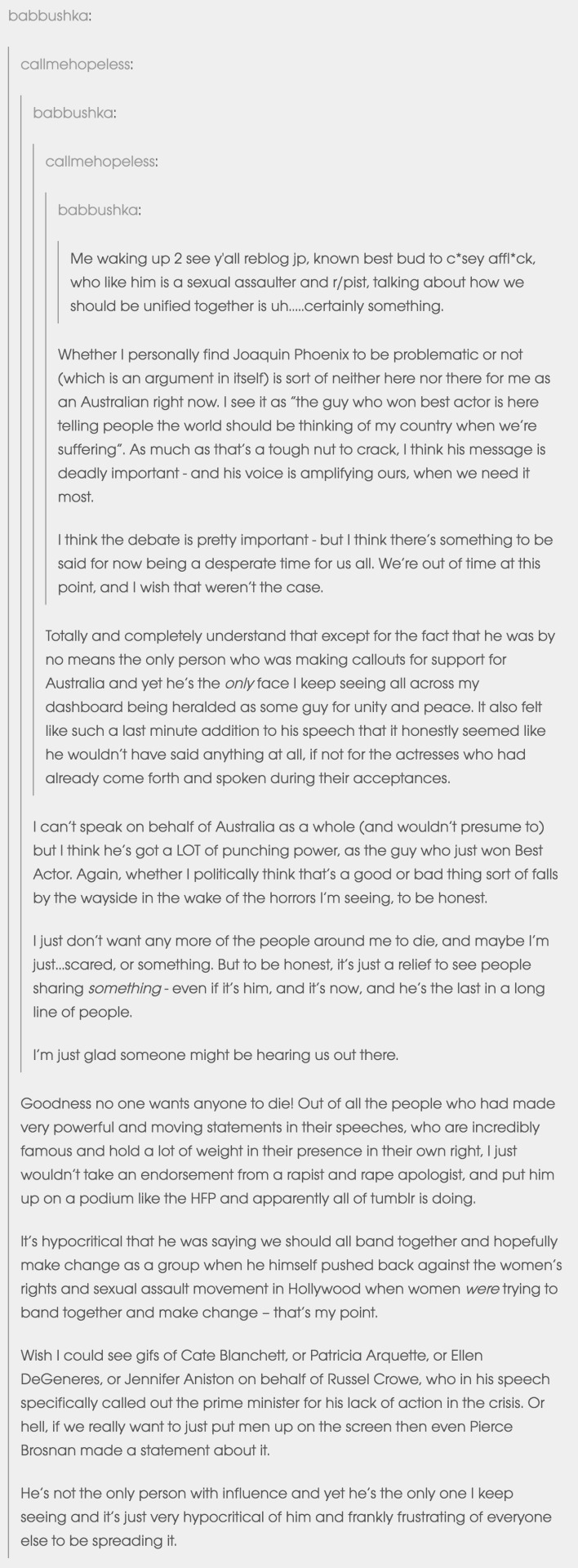
Hope was asked by a third party how they could help. She came back with a resource guide for those who wanted to send aid to Australians.
When it became obvious Zannah wouldn't silence Hope, Zannah decided to sub-post about the interaction. There, she accused Hope of being a rape apologist for reblogging a gifset and finding a little comfort in it. Zannah placed her ego before someone who was facing a very real danger.
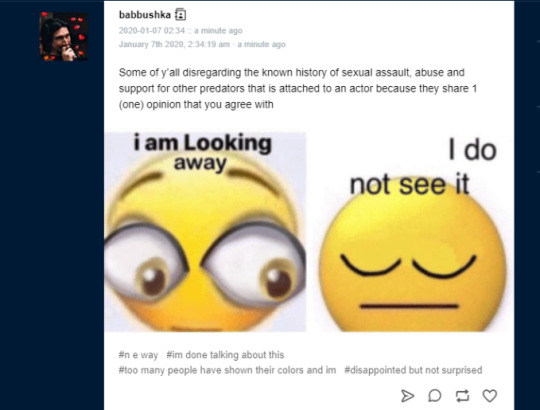
Side-eying an actor is one thing, shaming a person you know for finding solace during a scary time is another. Hope isn't responsible for which voice got picked up. The only "colors" being shown here are Zannah's. She put her own concerns about being perceived as morally pure above actually supporting a friend.
I'll keep this brief - I knew Zannah for many years. And on one of the lowest weeks of my life, when my suburb was burning down and I feared for my family: she convinced me I was a rape apologist for sharing Joaquin Phoenix's speech asking for action on bushfires. In all my life, I never felt more alone. To add insult to injury, she then posted memes mocking me - something that has stuck with me to this day.
I've had dear friends quit the fandom because of her kinkshaming. I've had people I love message me distraught over what she's said.
Enough is enough.
— @callmehopeless
-
Rose - @the-wayward-rose
This PM exchange started after I tagged my reblog of Zannah's fic Feast (Cameron Bistle x Reader) with cw: white reader. I had been on her taglist, and I wanted to show support because I liked the fic overall. For context, the reason for my tag is because of this sentence:
"But then you're blushing so pretty and squeezing his hand affectionately and reaching for the handle to the passenger side of his car, and then you're laughing when he swats your hand away to open it for you, and then you're beckoning him down as if to ask a question – only to place a chaste kiss to his lips instead."
This is from Cameron's point of view.
She asked the reason for the tag, and I explained it was because of the use of "blush" to describe Reader's appearance.
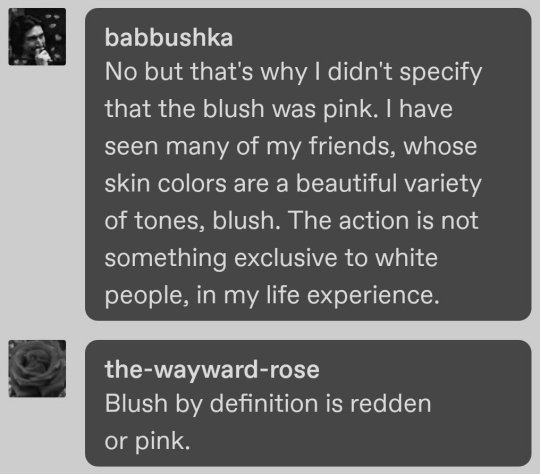
She misunderstood my premise. I did not mean only white people blush.
According to Merriam-Webster, blush means "a reddening of the face especially from shame, modesty, or confusion" or "a red or rosy tint."
It is an autonomic response, though. It happens in all humans for body cooling and nonverbal communication. The main problem with using it universally is that melanin obscures the appearance of said autonomic response.
Here's an example of three runners:

The two pale women, left and center, are pink in the face. They are blushing. The woman of color on the right is likely blushing, too. However, the melanin in her skin obscures the blood in her cheeks. She is not pink.
That's the pitfall of the word "blush." The observer can't always see it. We know what it feels like. We all do it. The face and/or neck gets hot. The use of "blush" is shorthand in narrative, and I understand that. Nevertheless, when writing to cater to a reader-insert audience of unknown heritage, writers need to consider describing with universal terms.
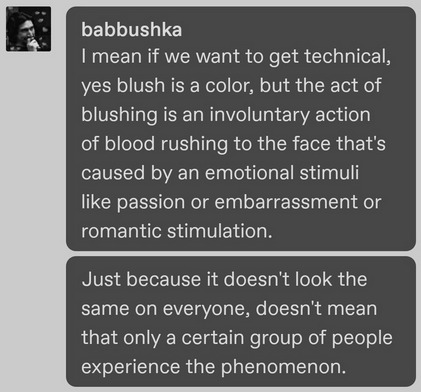
Again, she misunderstood my premise. I clarified by asking how Cameron sees the Reader blush under an abundance of melanin:

She sidestepped the physiological explanation to go straight for justification. She tried to legitimize "blush" as "perhaps [this]" or "perhaps [that]" when I stated earlier that blush by definition is pink or is to redden. That's the logic. A noncommittal, covering-all-the-bases, complicated defense diluted the conversation.
With her earlier "I have friends of color, hence I can't be exclusionary" statement, I wasn't sure she would get my point. I take full responsibility for not explaining, too. I should've asked for some time to gather my thoughts, but I didn't. Truthfully, I was unprepared, because I didn't think my insignificant tag would be an issue.
Also, I was confused why she was trying to police my blog.
Her replies came rapidly—before I could mention my confusion—and felt aggressive in the moment. Maybe that wasn't her intention, but the road to hell is paved with good intentions.
That doesn't take away from the fact that words have meaning. It's why we use specific words. It's not understood in the narrative that her use of "blush" could mean a bunch of things. If I had known, I wouldn't have tagged as I did. How is a reader of color supposed to know that? How does Cameron see Reader's blush if she has darker skin?
As writers, we don't know who is reading. Someone could be very pale or very dark. A person with medium-toned skin can turn a shade of pink or red. A person with darker-toned skin will not. We can't assume all readers are medium to pale. We need to develop better writing skills. We have to include everyone.
Readers of color > White-writer feelings
When I stood my ground, she doubled down, stating I made no sense in my tagging and that I lacked the ability to learn from her. She then diverted the argument, attacking a ficlet I wrote a few days beforehand—which had nothing to do with this argument. The Christian imagery in that ficlet was upsetting to her and "in such poor taste" because she headcanons Flip Zimmerman (BlacKkKlansman) is 100% culturally and ethnically Jewish.
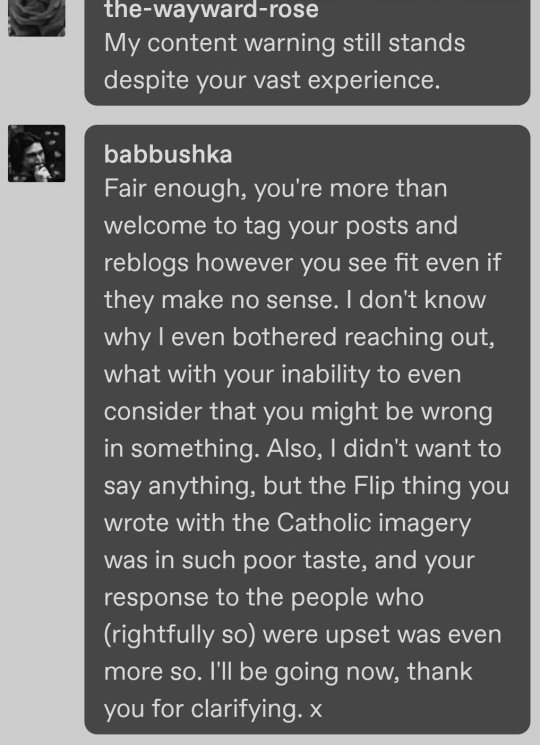
Flip stated in the movie:
"I'm Jewish, but I wasn't raised to be. It wasn't part of my life. I never thought much about being Jewish. Nobody around me was Jewish. I wasn't going to a bunch of Bar Mitzvahs. I didn't have a Bar Mitzvah. I was just another white kid. And now I'm in some basement denying it out loud[...] I never thought much about it. Now I'm thinking about it all the time. About rituals and heritage. Is that passing? Well then, I have been passing."
By his own admission, Flip is ethnically Jewish, but not culturally. These are two separate things, and that should be recognized. While Judaism is ethnically and culturally entwined in ways that other religions are not, one does not equate the other. You can be one and not the other.
At the time, I didn't want her to sic her 3000+ followers on me. I wasn't going to argue further. I asked myself if the ficlet was important and worth anon-hate and realized, no, it wasn't. It was a throw-away.
And since I'm not culturally Jewish, maybe I had misstepped. And since Zannah is both culturally and ethnically Jewish, I asked for her guidance.
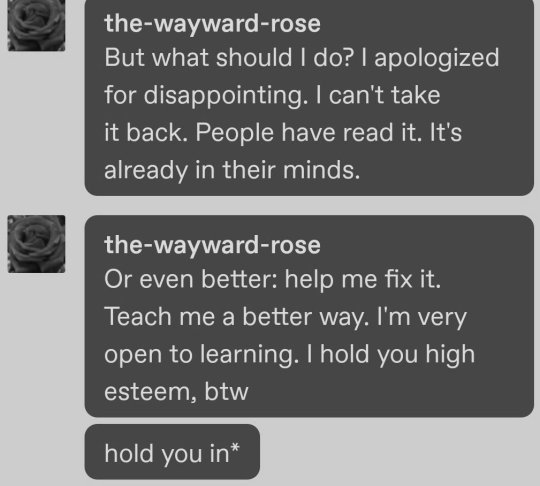
She flatly refused my request. I don't know how I was supposed to learn from her if she wouldn't teach me.
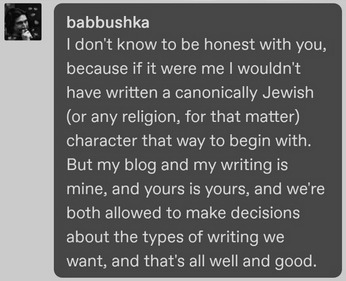
It sounded as if she wanted me to delete the whole fic. Like none of it was worth saving because it hadn't been Zannah-approved. I had gone against her headcanon, and the fic was too offensive to fix.
The last sentence was supposed to cover her back from criticism, and it placed all the responsibility on me. Obviously, she was above such petty concerns as someone else's blog or writing. Never mind that she had just attempted to get me to change my tagging system and rewrite my ficlet. On my blog.
Later, I figured out she was only criticizing and not offering a constructive critique. Her argument was not in good faith. It was retaliation for not giving her the obedience she thought she was owed.
This is the passage that offended her:
"It’s because of the way he fucks you. Like it’s confession—though he’s never been much of a church-going man. Every touch, every thrust, is a truth between you. Even when it’s rough and greedy. It feels like flagellation when you claw his back. He wears the sin proudly."
This is what I edited it to:
"It’s because of the way he fucks you. Every touch, every thrust, is a truth between you. Even when it’s rough and greedy. It feels like flagellation when you claw his back. He wears your marks proudly."
Yeah, I'm not pleased with the revised passage. It's lost its teeth, but I keep it.
The anonymous message(s) she mentioned weren't very anonymous, either. Unfortunately, I've since deleted the two messages. I had apologized to Anon for disappointing them. I said that if the fic was too much, they should unfollow and block me. I meant that in a self-care way. At the same time, I did not—and do not—owe anyone discourse. I don't have to explain my art when it doesn't hurt anyone. And no one was hurt by some purportedly misplaced religious imagery.
I have been silent about this since late January/early February. I was embarrassed. I had been bullied into changing my blog and my fic by someone who proclaims to never do anything of the sort. I had been a fool. Since this conversation with her, I have been blocked/blacklisted by third-parties, most likely at her behest, when none of this exchange had been necessary.
-
Kassanovella - @kylorengarbagedump
Zannah's followers have asked her about Kassanovella’s Fix Your Attitude. For context, it's currently one of the most kudo-ed fics for Kylo Ren x Reader on AO3. It had a bit of a renaissance earlier in 2020 because a TikToker wrote a song for it.
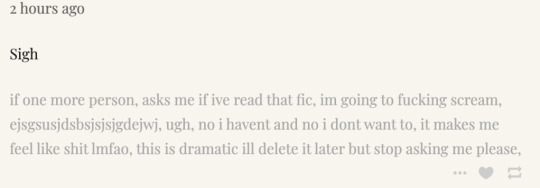
There is nothing wrong with not wanting to read a fic. If the subject matter doesn't work for a reader, they don't have to partake. Easy as that. So, these tags aren't a problem.
However, it led to this...
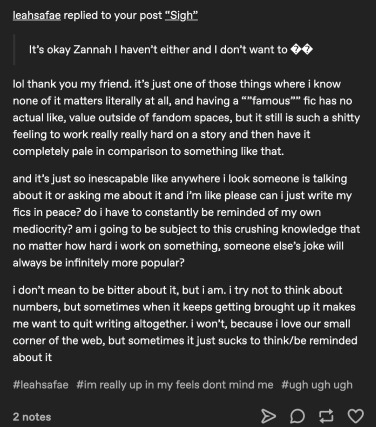
She lashed out, calling Kassanovella's fic a joke. A joke.
She implied her fics should be as popular as Kassanovella's because she works really hard on them. She admitted she's tied to the metrics. She implied she wouldn't be writing fic if not for the external validation.
Here's the thing about fanfic: readers like what they like. They don't care about a writer's effort. They only know what works for them. They comment and give kudos, reblog and like what they connect with. That is not under the writer's control. All a writer can do is try their best and concentrate on what they're passionate about.
To bash another writer's fic because it's popular is disrespectful. This whole bitter rant drips of entitlement and is an affront to Kassanovella.
Some time later, an incident happened in a chatroom during a streaming event for veterans by Arts In the Armed Forces (Adam Driver's organization). At least one fan brought up Fix Your Attitude while waiting for Mr. Driver to make an appearance. They were also disrespectful towards the other presenters by demanding to see Mr. Driver. It caused a big stink within the fandom, and Zannah had some choice words.

While mentioning the fic during the livestream was inappropriate, it was also inappropriate to throw all fans of the fic under the bus as she did in her tag. Sweeping generalizations and incriminations of a subset of fans certainly reads as if she resents those fans for a perceived slight.
Next, Zannah made an earlier disparaging comment about Kassanovella's fic, Little Bird. Unfortunately, that comment is lost. However, the messages supporting the comment remain. (For context, Little Bird is a Kylo Ren x Reader The Handmaid's Tale AU. It has been well received in the fandom, earning thousands of kudos on AO3.)
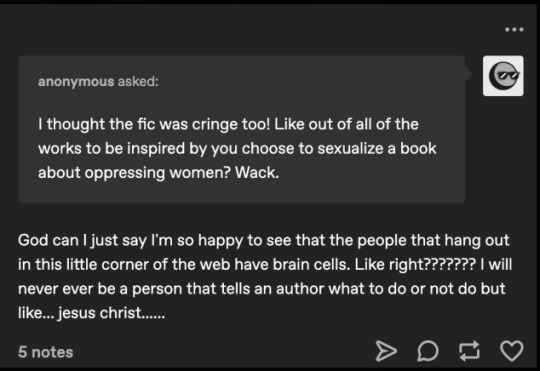
What an author wants to write about and sexualize is their business. Fantasizing about being dominated by Kylo Ren isn't cringe. It's a sexual fantasy. Some sexual fantasies can be disturbing to those who do not share the same kink.
Sexual fantasies are like ice cream. There's a reason why there are different flavors.
Also, "I will never ever be a person that tells an author what to do or not do" is an absolute lie. As evident in this post, Zannah most definitely tells authors what to do or not do.

Again, she bashes Kassanovella, claiming her writing isn't good. Her motivation for bashing Kassanovella can only be speculation. With Zannah's previously stated opinion of Fix Your Attitude, though, it indicates a certain level of negative emotions.
-
Anonymous
An anonymous person came forward with a case of Zannah policing their blog. Anon has a sideblog for their personal AU with Flip Zimmerman. They reblog gifsets and post headcanons. They were an enthusiastic fan of Zannah's and reblogged a few of the gifset she made. Anon tagged their reactions, and Zannah blocked them for it.

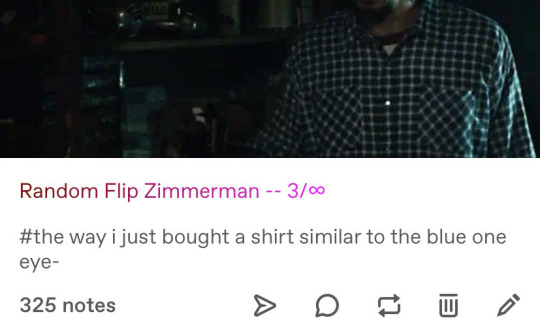


Anon went to Zannah and asked why they were blocked, because all they wanted to do was have fun and support fellow Flip lovers.

Anon was under the impression that because they were shipping themselves, and not Zannah, with Flip, she blocked them. Their personal AU doesn't align with Zannah's headcanon that she alone is married to this character and has his children.
While Zannah's reply may sound innocent, and perhaps it is, it also speaks to someone who has set herself up as the owner of Flip Zimmerman. (Wait until Spike Lee or the real Ron Stallworth hears about that...) It appears that if a fan does not comply with the Zannah-approved headcanon, where only she is married to Flip, that fan shall be blocked. If a fan uses tags on their blog that she does not approve of, that fan will be blocked.
Zannah's policing is disturbing. Going into a blog to look for something as a reason to block is disturbing. Any fan is allowed to use any tag on their blog how they wish. If the OP has said their post can be reblogged, how a reblogger tags is beyond the OP's control. To punish that reblogger for not behaving in a way she finds acceptable is uncalled for and unjust.
-
Anonymous
Backstory: Zannah does not view Ben Solo's arc in the Star Wars sequel trilogy as acceptable canon. However, she does view the story she created for Flip Zimmerman in BlacKkKlansman as completely canon.
This is not the first time she has been asked to clarify her position. Nor is it the first time she has avoided giving an on-topic response. A question asked in good faith should be responded to in kind.
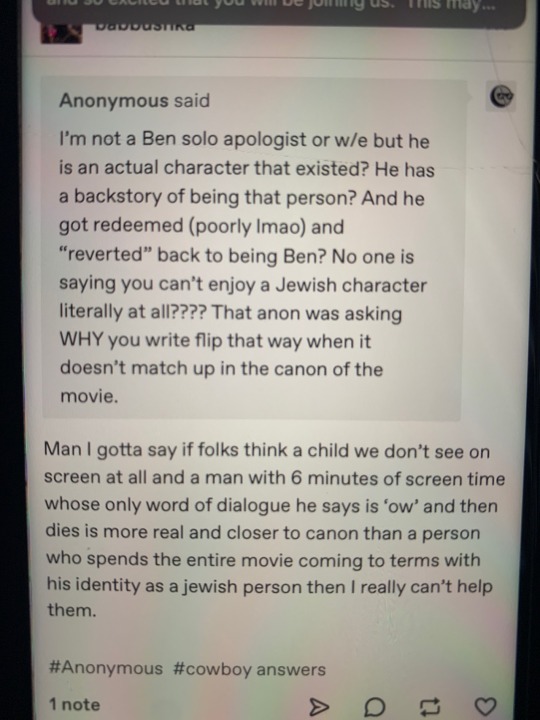
If a creator doesn't want to address the issue, they can state that they don't. Deflecting from the question only muddies the waters. Fans feel dismissed. The creator feels hounded, and comes across as irritated and unapproachable. No one has a positive fandom experience.
There is nothing wrong with having a headcanon. What is wrong is Zannah mandating her headcanon for Flip on the whole fandom. As evident in this post, if a fan does not comply with her headcanon, they will be summarily blocked.
Also, there is nothing wrong with rejecting canon. Writers of transformative works have always done this. The problem is shaming fans who have accepted canon while not offering justification for that shaming. A creator saying they "can't help them" is the creator washing their hands of responsibility from articulating their thoughts when they themselves began criticizing the canon in the first place.
Again, this is a bad-faith argument. Creators can't ask for discussion and attention and then get mad when their viewpoints are challenged. Just because a discussion isn't going a creator's way doesn't mean it's an attack, either. It means people want clarification, and if one criticizes, they should be able to back up their criticisms.
-
While sharing our stories has been freeing, it's not our aim as fellow fans to cancel Zannah. We would hope she would take the opportunity to reflect on the damage she has done to the fandom. We hope we all can move forward with a more approachable and supportive scene.
No one person speaks for our fandom. The actions of one fan do not represent the entire fandom. Whether creator or consumer, you are welcome here.
[posted July 25, 2020]
308 notes
·
View notes